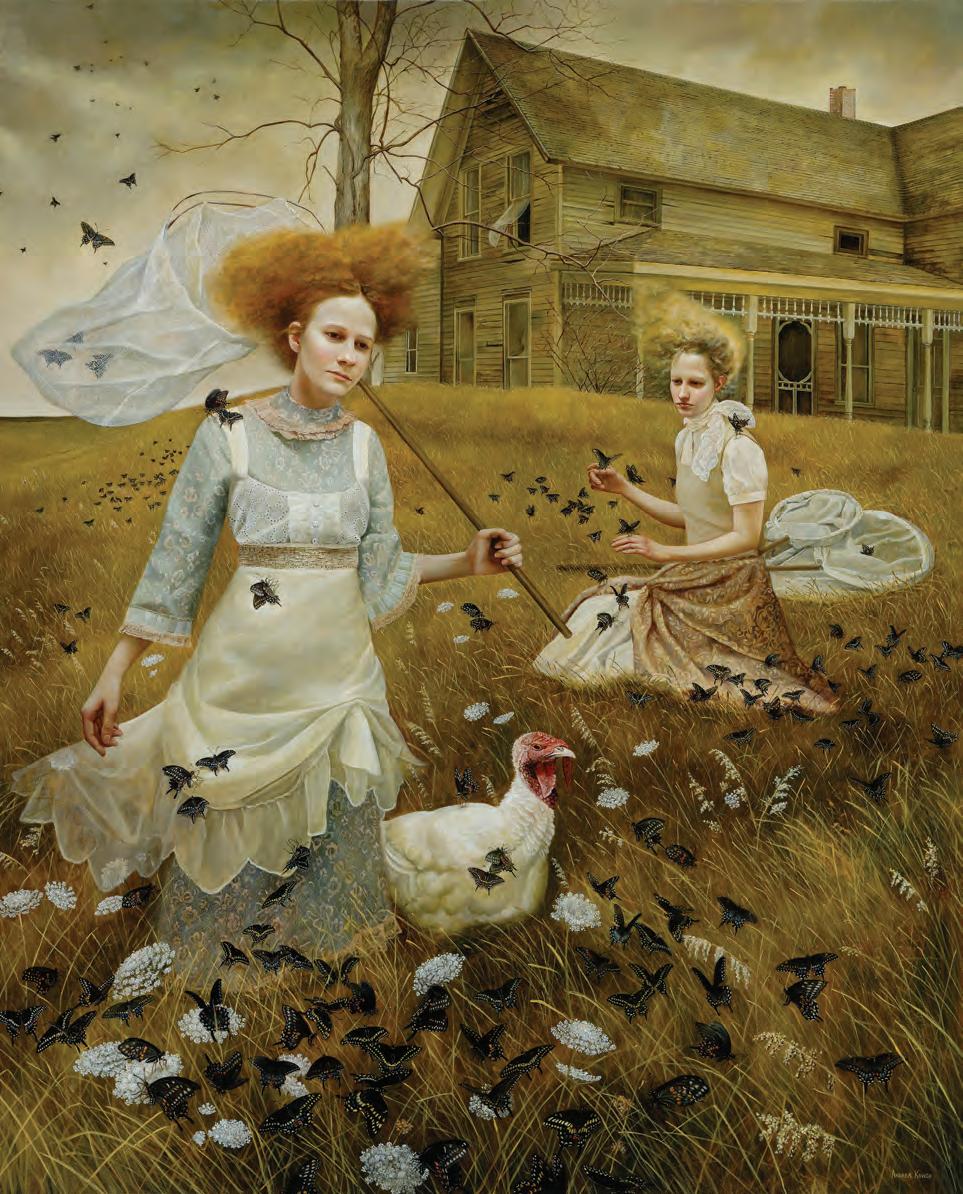MYSTERIOUS REALMS
ANDREA KOWCH





Dagny Robertson, President
Solomon Greene, Vice President
Judith Thompson, Immediate Past President
Mary Jeanne Ludwig, Treasurer
John Wilton, Secretary
Karen Allebach
Dennis Aylward
Samuel Blatt
George Bolge
Jean Burns, Museum Guild Representative
John Clifford
Vernette Conrad, Museum Guild President
January 14 - April 9, 2023
Sal Cristofano
Greg Dasher
Manny De la Vega
Linda Colvard Dorian
Barbara Girtman
Kyle Glass
Joan Lee
Lisa Ogram
Todd Phillips
Glenna Roof
Ian Williams
Pattie Pardee, Executive Director
Dorothy Dansberger, Director of Finance & Operations
Tariq Gibran, Curator of Art & Exhibitions
Martha Underriner, Curator of Education
Jodi-Ann Taylor, Associate Curator of Education
Pam Coffman, Education Consultant
Teri Peaden, Store Manager
Darlene Shelton, Manager of Guest Services
Alex Westfall, Assistant to the Executive Director
Stephanie Clark, Marketing Consultant
Stephanie Clark
Taylor Communications
OF ART - DELANDMUSEUM OF ART - DELAND

On the Cover: Soiree , 2019, Acrylic on Canvas, 24 x 36 in., Collection of Jim and Jennifer Seale
On the Back Cover: Sojourn , 2011, Acrylic on Canvas, 72 x 60 in., Grand Rapids Art Museum, Museum Purchase, Booth Collection, 2012.52
Copyright ©2023 Museum of Art - DeLand. All rights are reserved. No part of this publication may be reproduced, stored in a retrieval system or transmitted in any form or by any means: electronic, mechanical, photocopying, recording or any other method without the written consent of the Museum of Art - DeLand.Collection, 2012.52
Sponsored in part by the State of Florida, Department of State, Division of Cultural Affairs and the Florida Council on Arts and Culture.



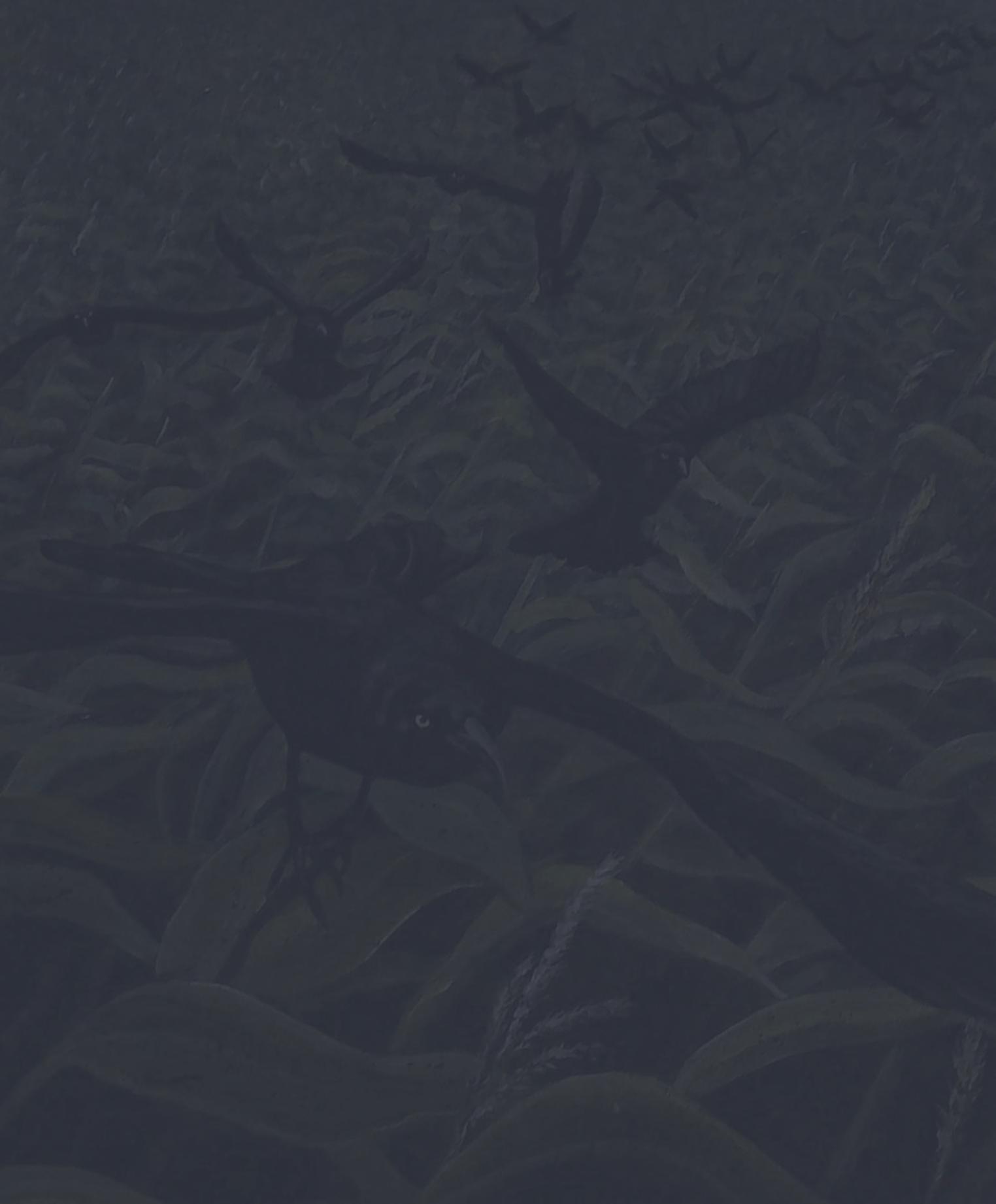 ANDREA KOWCH
Photo: Marsin Mogielski
ANDREA KOWCH
Photo: Marsin Mogielski

Inspired by memories, inner emotions, history, and my fascination with nature and the human psyche, the stories behind my paintings stem from life’s emotions and experiences, resulting in narrative, allegorical imagery that illustrates the parallels between human experience and the mysteries of the natural world.
The lonely, desolate American landscape encompassing the paintings’ subjects serves as an exploration of nature’s sacredness and a reflection of the human soul, symbolizing all things powerful, fragile, and eternal. These real, yet dreamlike, scenarios serve as metaphors for the human condition, all retaining a sense of vagueness because I wish to involve and motivate the viewer in uncovering the various layers of mood and meaning to form conclusions from their own perspective, despite that my main idea will always be before them.
We all share a common thread, and as active participants in an ever-changing modern world, the purpose of my work is to remind viewers of these places that we sometimes perceive no longer exist, and to recognize and honor them as a part of our history that is worth preserving.
In juxtaposing the human form with animals and a bygone uninhibited American landscape, I provide glimpses into “rooms,” those oftentimes chaotic places we possess internally. The rural, Midwestern landscape of my home state serves as backdrop for the stage of human emotions. The animals present are vehicles for expressing the feelings and underlying tensions suppressed behind the human mask. Symbolic explorations of the soul and events concerning our environment are expressed through the combination of these elements to transform personal ideas into universal metaphors.
Detail: The Merry Wanderers, 2013, Acrylic on Canvas, 24 x 36 in., Collection of Leslie and Barbara Norman, Fairview, North CarolinaImagine going to the theater to see a collection of one act plays written and directed by Alfred Hitchcock, sets designed by Edward Hopper and casting, costume and make-up by Andrew Wyeth and Johannes Vermeer. This is what it is like to experience the Mysterious Realms of Andrea Kowch.
Andrea Kowch is a highly acclaimed American Magic Realist artist, (born 1986) in Detroit, Michigan. She attended the College for Creative Studies on scholarship, and graduated Summa Cum Laude with a BFA in 2009. Kowch is the recipient of numerous prestigious awards and honors which include being selected by SCOPE NYC as one of the top one hundred emerging artists in the world in 2012. Her work can be found in many significant private and public collections worldwide.
A painter with undeniable skill, technique and talent, Andrea Kowch is likewise a consummate storyteller and astute observer of the connections and contradictions between the human experience and natural world. At first glance, her paintings have familiar, yet dream-like qualities that lure you in only to reveal haunting and seductively disquieting narratives. Kowch works with an ensemble of mostly female characters, real-life friends who model for her. She places them singularly or in groupings in her beloved rural landscape and architecture of the American Midwest or in farmhouse settings reminiscent of a bygone time. Kowch’s characters have been described as classical, timeless, inscrutable, detached, wistful, solitary, and stoic. She says “they each carry a specific quality that is uniquely them, and oftentimes, that particular quality happens to be one that I also possess or resonate with on some hidden level — as if each one of them, in some way or another, is an extension of me — and that is a factor that draws me in and to them, and subsequently inspires me to include them in my scenes.”
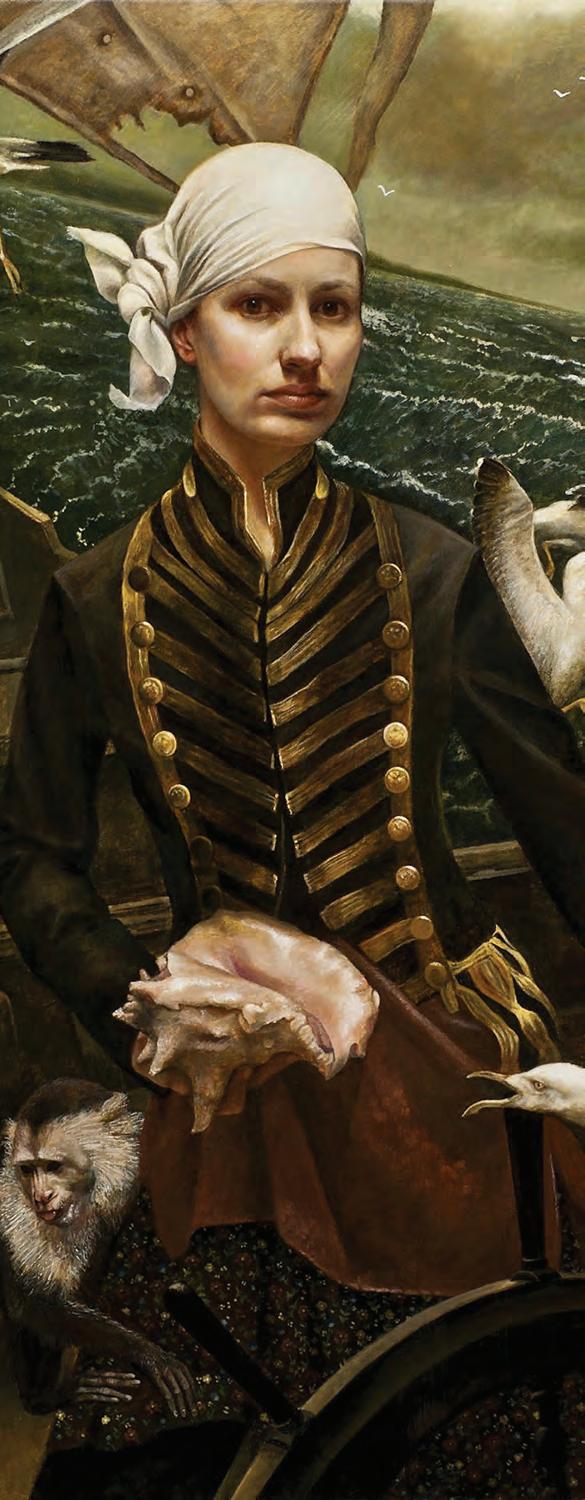
There are many other characters animate and inanimate, animals - domestic and wild, birds, insects, fire, wind, sea and weather that have significant roles and share the space with their human counterparts in Kowch’s paintings.
Each painting is a complete story, a wordless, mysterious allegorical drama, but one that is interconnected by a common theme with those that came before and after. Andrea Kowch explains this unifying theme is her desire “to remind viewers of these places that we feel no longer exist, and to recognize and honor them as a part of our history that is worth preserving. Symbolic explorations of the soul and current events concerning our environment are expressed through the incorporation of animals and other elements of the natural world to transform personal ideas into universal metaphors.”
Andrea Kowch’s acrylic paintings are composed of a myriad of exquisite details resulting in a three-dimensional quality that immerses viewers in the action as if they were watching a play staged in a theatre-in-the-round. An unexpected element of seeing Kowch’s works in person is the scale of the paintings. When viewing the images in a book, print or internet one might assume that they are quite large because of the thoughtfully composed complex layers of imagery, but a number of the works are quite small, some measuring no more than 8” x 8”. Creating paintings with so much detail and visual breadth on a small scale is truly remarkable and only reaffirms the accolades for Andrea Kowch’s mastery and talent.



Like the fifth wall in the theater, Kowch’s adept and well-orchestrated compositions create a realm beyond the boundaries of the picture frame. Her use of universal metaphors and symbols encourage multiple interpretations and serves as an invitation to the viewer to “step” into the scene and become an active participant in the narrative.
“The Feast” offers such an invitation to viewers to break the boundary of the frame. Kowch says “(I) leave things open to interpretation for viewers to attribute their own unique personal experiences to it. It’s almost like characters on a stage. So, each image is a story that I just want people to delve into and explore.”
The painting is an iconic example of Kowch’s ongoing exploration of the relationship and dualities between the human psyche and natural world. It is composed of numerous recurring themes and motifs that pervade her oeuvre including: enigmatic female characters; the lonely sprawling countryside; domestic settings and women’s work; open windows and doors; an assortment of animals; the bounty of the harvest; the wind as a powerful symbol of inevitable changes; a sense of time passed; and the ever present air of mystery and the unexpected.
According to Andrea Kowch, “The Feast” was a major artistic milestone because it marked a turning point in her series, her development and advancement as an artist, and it was her first large-scale piece (60 x 84 inches). Everything in the painting is scaled to life-size making the image even more compelling and “real” for the viewer.
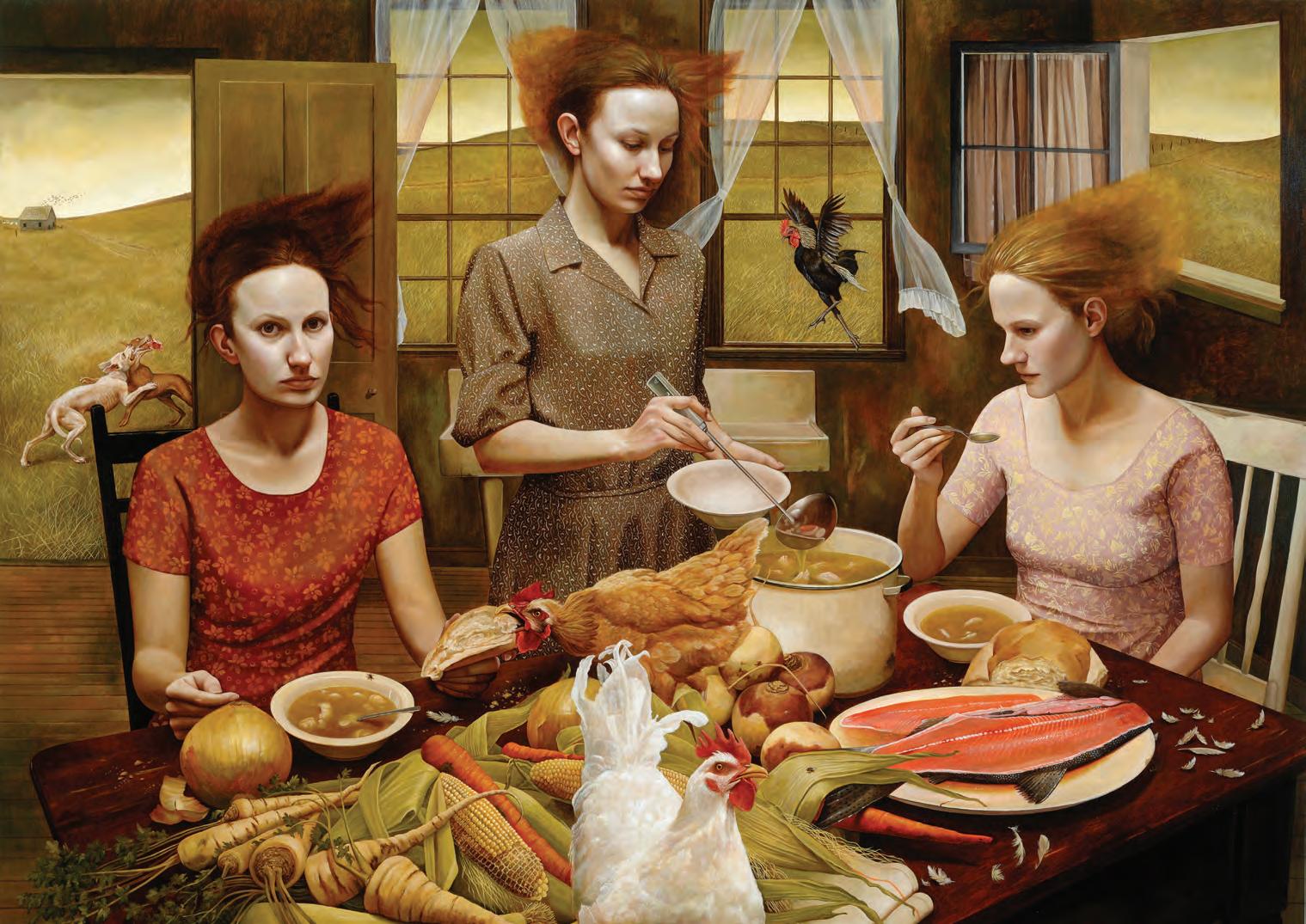
The scene takes place at a farmhouse table. A palette of earthy, autumnal colors impart a subdued and slightly ominous mood. Three female characters gather round the table, each engrossed in their own thoughts and space. Their hair, windblown, is wild and askew. Two of the women are seated at the table and the third stands in the middle between them. The table is laden with a bounty of fresh vegetables from the harvest – parsnips, carrots, turnips, corn and onions, a plate of raw salmon fillets, a large pot of soup, two serving bowls of soup, a torn loaf of bread, a brown chicken and a fluffy white one and white feathers scattered about the tabletop.
The woman on the viewer’s left sits in a dark chair on the side of the table. She is wearing a rust-colored floral print dress. Her dark eyes wide and intense, she looks directly at the viewer seated across from her. There is a bowl of soup with a spoon and a fly on the rim placed in front of her. She holds a piece of bread in one hand seemingly unaware of the brown chicken that pecks greedily at her food, its watchful eye focused on the viewer.
Is the woman unsettled because an uninvited guest interrupted her meal? Is her cold stare one of unwelcome or disdain or something more? Should she be warned about the danger posed by the chicken’s sharp open beak? Behind the woman is an open door with two bony snarling dogs fighting over what appears to be a bloody animal leg. Teeth bared, eyes wild, this is no idle play. Further in the distance an old barn, a flock of birds and tracks leading to and from the barn can be seen through the doorway. The ferociousness of the dogs, the glaring eye of the chicken, the woman’s stern mask-like face juxtaposed with the bucolic landscape and bountiful feast creates a sense of vulnerability, unease and palpable tension that boils over engulfing the viewer.
The woman in the middle is standing at the table. She is neatly dressed in a light-brown and tan patterned frock and is completely absorbed in the task of ladling soup from a large pot into her empty bowl. Her auburn hair is blown from side to side as if a strong wind is coming from behind her. She is positioned in front of two multi-paned windows with filmy white curtains. One window is closed; the other opened half way, its sheer curtains billowing in the breeze. A black and gray chicken, wings upraised, totters on the sill buffeted by the wind. The view outside of the windows reveals a vast open field with gently rolling hills covered with hay-yellow prairie grass. What appears to be wagon tracks or a dirt trail can be seen leading to the barn. Her hair and the precarious stance of the chicken are inconsistent with the breeze blowing in the room. It is as if the wind is a unique presence, an invisible force, moving at its own direction. Is the woman aware of the wind? Why is she so absorbed in her task that she ignores her counterparts? Do the windows behind her – closed and only partially open symbolize her guarded thoughts and feelings?
The third woman is seated at the opposite end of the table, her gaze inscrutable. She is wearing a dusty rose and pale butter-yellow dress that compliments the tones of her perfect porcelain skin. She has one arm in her lap, the other elbow bent as she mechanically lifts a spoonful of soup towards her mouth. The four-paned window behind her is swung open against the wall showing more of the open field and hills. Her blond hair is being sucked backwards towards the window by the powerful force of the contrary wind, yet she seems completely unaware of this disturbance. The woman’s composure provides no clues to her thoughts. How can she sit so self-contained and unaware of all that is taking place around her?
All of the action in the scene is frozen in mid-movement - the pecking chicken, ladling of soup, lifting of the spoon, billowing curtains, teetering chicken and fighting dogs. Everything is portrayed in stop action motion except the wind. This invisible character, always changing directions, inevitable, and unpredictable propels the action in the composition and symbolizes underlying currents of emotion, transformation and a powerful spiritual force.
Andrea Kowch’s vision, talent, skill and mastery as a Magic Realist painter and consummate storyteller are undeniable, but perhaps her greatest magic is the ability to create mysterious realms where the viewer can pull up a chair, take a seat at the table, have a cup of tea, feel the wind, smell the smoke, hear the call of the animals and imagine what happens next.
Education Consultant, Museum of Art - DeLandSince the turn of the 20th century, art historians and curators have debated the relative merits of representational versus abstract art. Indeed, in the 100 years after 1900, the examples of art depicting nature in a representational fashion shrank as the Fauvists, Suprematists, Cubists, Vorticists, Dadaists, Constructivists and Abstract Expressionists, among others, played with, distorted and, ultimately, abandoned realism as a mechanism of artistic expression. But, “what goes around comes around,” and what many artists of the late 20th and early 21st centuries have (re)discovered is that abstraction, no matter how visually compelling, cannot reliably convey meaning and emotion, let alone messages about subjects of deep significance such as love, war, hate, oppression, or happiness.
Fortunately for the viewing public, the thirst among many currently living artists to project meaning and touch the emotions of viewers has created a whole new generation of, dare I say it, figurative realists artists who depict tangible persons in discernible places confronting identifiable situations. Moreover, in this resurgence of realism, we can once again celebrate allegory and metaphor, fantasy and mystery. These renascent realists and, in particular those who focus on human beings and people-centric situations, have gone back to an earlier time and mastered the methods and techniques that artists at one time had to possess in order to be worthy of the name. In their quest to create unique, expressive, representational work, these 21st century realists have once again mastered the science of rendering and depiction that actually requires particular technical skill to achieve.
Today, at the very top of this group of artists is Andrea Kowch, a consummate figurative painter who has wedded her prodigious technical skills with deeply evocative and thought-provoking scenes that betray her protagonists’ (and our) lives for the ambiguous mysteries they are. She has been called an American Magic Realist, a Symbolist and a painter of allegories but, whatever label applies, Andrea is an unmatched painter of women in settings that betray their vulnerabilities, their spiritual defenses and their strengths, sometimes separately and sometimes all at once.
Against a backdrop of carefully conceived landscapes and interiors, her confident and often seemingly detached yet resilient women stand above a usually cryptic and peculiar fray, undertaking their comings and goings in circumstances that are at once archetypal, equivocal and, often, unsettling. These abstruse depictions magically carry us, paradoxically and simultaneously, both outside ourselves and deep into the very center of our own personal dilemmas. Adding to this lusciousness, Andrea’s spaces are often uniquely infused with a combination of poise and uneasiness that fill us with a sense of marvel about our own lives as well as wonder about the persons depicted.
As one views Andrea’s work, they will see that certain motifs emerge again and again. First, the figures, which are usually young women, appear introverted, stoic, indignant, indifferent or, sometimes, focused on an inner rhythm which the viewer can discern but cannot deconstruct.
Second, these women frequently appear in settings that are windy, stormy, unsettled and, sometimes, reflective of calamity, either a disaster that one senses is coming or one that is in progress. Third, all of the paintings possess an urgent, ominous or, occasionally, peaceful undertone that infuses the work with an otherworldly, even numinous, quality. Yet, despite the often troubled or supernatural circumstances, these women never seem overwhelmed or frightened. Rather, they more often than not reflect a self-sufficient detachment from their surroundings. Finally, there is frequently a juxtaposition between the subjects and some activity that is taking place beyond them, usually in a landscape behind or in the distance through a window.

These qualities emerge in Andrea’s earliest paintings and continue to reverberate through her more recent work. For example, in The Visitors, we see farm women hard at work in a rustic kitchen. But they are not alone. Coming in through the windows are birds, numerous black birds, which disrupt the scene and help themselves to the food.
As the pies bake, the windblown hair of the women implies a storm outside, but the women seem strangely detached from the disruption caused by the birds, tending to gaze at the viewer or at the birds or down at their work with smirks or looks of tolerant indifference. We sense the wind blowing the wheat outside and feel the heat of the stove as the curtains sway in the breeze yet we wonder at why these women toil and what relation exists between them. The scene is rustic, and more than just slightly surreal.
These issues play out again in Andrea’s other “Kitchen Paintings,” works in which women eat, serve or prepare food against a backdrop of portentous winds, curious and sometimes irritated animals, or disasters in progress. And, as always, the depicted women display a peculiar detachment that is sometimes a mixture of exasperation, apathy and hypnotic trance. In addition to The Visitors, the pinnacle examples from this series include The Feast and An Invitation. In The Feast, a group of “farm women,” whom one might rightly conclude are sisters, eat soup at the kitchen table as chickens peck at the food and dogs in the doorway fight over what appears to be a piece of meat. The women, their hair as windblown as the curtains behind them, seem oddly restrained, as if the circumstances were commonplace and there is nothing more to say. Nevertheless, the woman on the left gives a steely glance at the viewer as if to ask, “Why are you here?”
Likewise, in An Invitation, a similar group of women eat at a table on the porch of an aging, unpainted farm house as irate animals pick at the food. In the background, a white horse gallops toward a stormy horizon. Again, a private, contemplative world seems to possess each woman, one of whom is so distracted by her inner visions that she misses her teacup as she pours the cream. As in The Feast, the woman in the left foreground glowers at the viewer although one is never sure if she is looking at us or through us.
Reunion, 2018, Acrylic on Canvas, 36 x 36 in., Private Collection
“These abstruse depictions magically carry us, paradoxically and simultaneously, both outside ourselves and deep into the very center of our own personal dilemmas.”
In the “Calamity Paintings,” Andrea juxtaposes her subjects against catastrophes occurring around them, often fires blazing in the background. In Flame, a young woman stares with an expression of careless indignation upon the intruding viewer while eating a breakfast of flapjacks and plums. Meanwhile, her dog, looking the other way, watches a hay wagon burn in the field beyond. One asks, is the woman the one who set the fire, or, does the fire symbolize the subject’s inner response to her circumstances, or the long-awaited resurrection and rebirth of her existence. The answer is always left for the viewer to resolve. Similarly, in another calamity painting, No Turning Back, the subject, her bound hands having snapped their tether, stands thigh deep in a wheat field that is ablaze, the fire heading toward the weathered, old frame house behind her as birds, curtains and the subject’s hat blow in the wind. We want to ask ourselves, what were the young woman’s (now broken) bonds and circumstances, and was the effort to break them so intense that it set the entire landscape ablaze? Other calamity paintings emphasize tornadoes (reminiscent of John Steuart Curry), crashing waves and flocks of agitated birds.
Finally, in the “Lone Woman Paintings,” the viewer confronts a single woman who is anticipating what is to come, reflecting on what has occurred or reveling in a circumstance around her that only she can (or cannot) control. In Reunion, a young woman sits on a brocaded seat in an ancient railcar clutching a gift as her dog sits beside her. In the compartment’s window we see a truck coming up alongside the train. The young woman’s forlorn visage betrays her anticipation of the reunion that is apparently at hand. In The Courtiers, a powerful woman, obviously possessed of an ability to speak to the animals, communes with a flock of sandhill cranes as she gently grasps the leash of her mascot, an albino peacock. Each bird exudes its own personality as the flock coalesces around its queen, paying homage to the human from whom they derive a sense of belonging, of purpose. Likewise, the peacock fans its tail feathers in a momentous display of power and magic. In the background, the farmhouse sits in a stubbled field, the ground fog betraying a dropping temperature as dusk turns to night or, perhaps, dawn turns to day.
When one surveys the breadth and depth of Andrea Kowch’s work, they realize that she is more than an artist, she is the quintessential figurative realist painter—a conjurer of magic, symbols and allegories that challenge the viewer to both puzzle over what may have overtly happened in the scene before them and what is happening and has happened in their own lives, their own souls. The work thus displays a beguiling ability to depict scenes of wonder while challenging viewers to ponder parallels about and within themselves. When one views Andrea’s work, they rejoice in the resurgence of both realism and the commitment of a new generation of painters to invest themselves in learning the art and science of depiction and portrayal, nature and symbol.
Steven Alan Bennett and Dr. Elaine Melotti Schmidt established The Bennett Collection of Women Realists® in 2009. The two collectors limit their collection to figurative realist paintings of women by women artists. The Collection includes work by some of the most exciting women painters currently working: Julie Bell, Margaret Bowland, Aleah Chapin, Aneka Ingold, Andrea Kowch, Alyssa Monks, Katie O’Hagan and dozens of others on the cutting edge of figurative realism. In addition, the Collection includes historic women painters from across the generations, including Gertrude Abercrombie, Artemisia Gentileschi, Elaine de Kooning, and many others.
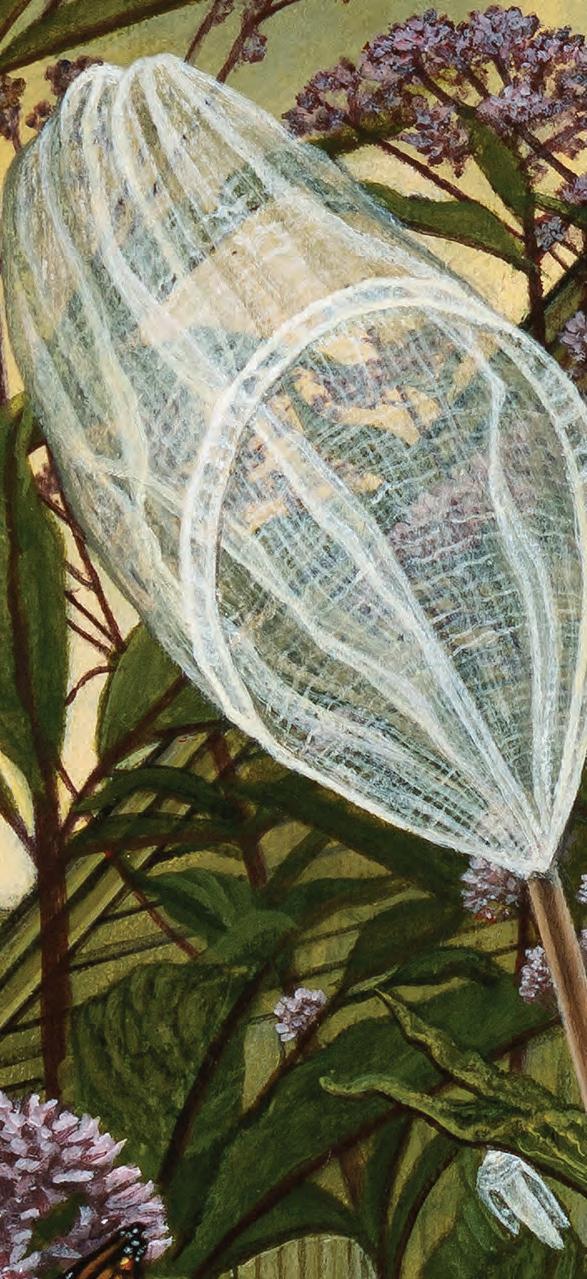

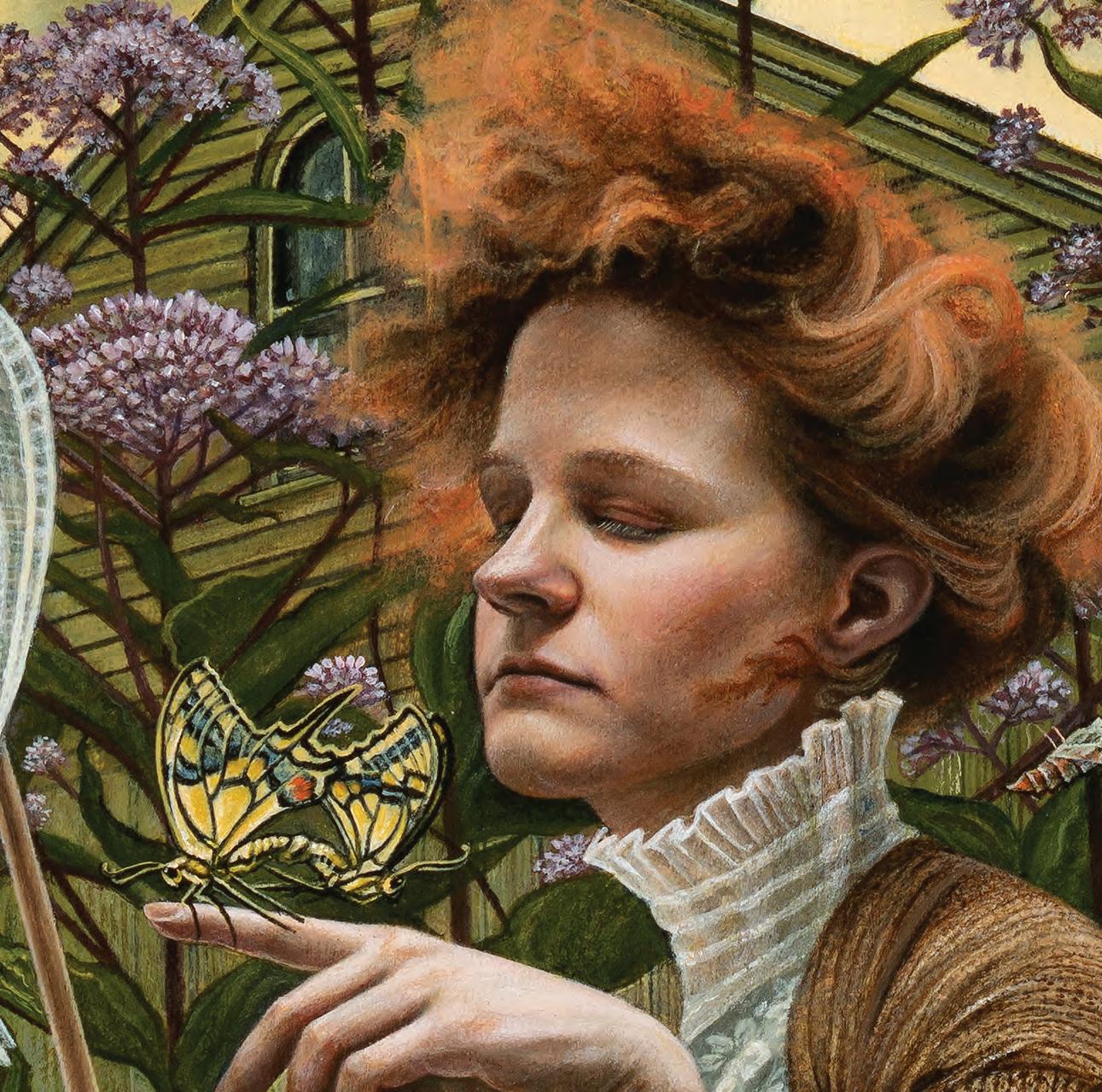
 Blackbirds Are Gathering, 2007
Acrylic on Canvas, 24 x 36 in.
Blackbirds Are Gathering, 2007
Acrylic on Canvas, 24 x 36 in.
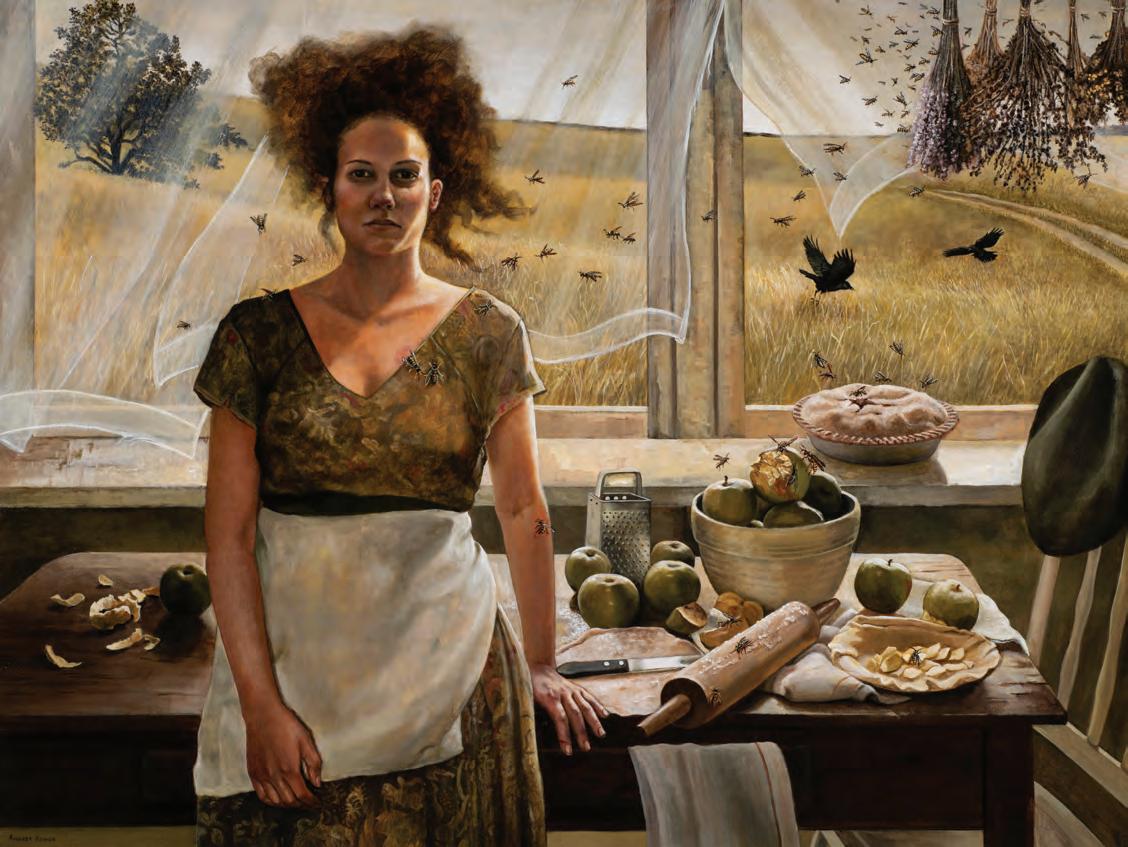 Apple of My Eye, 2009
Apple of My Eye, 2009
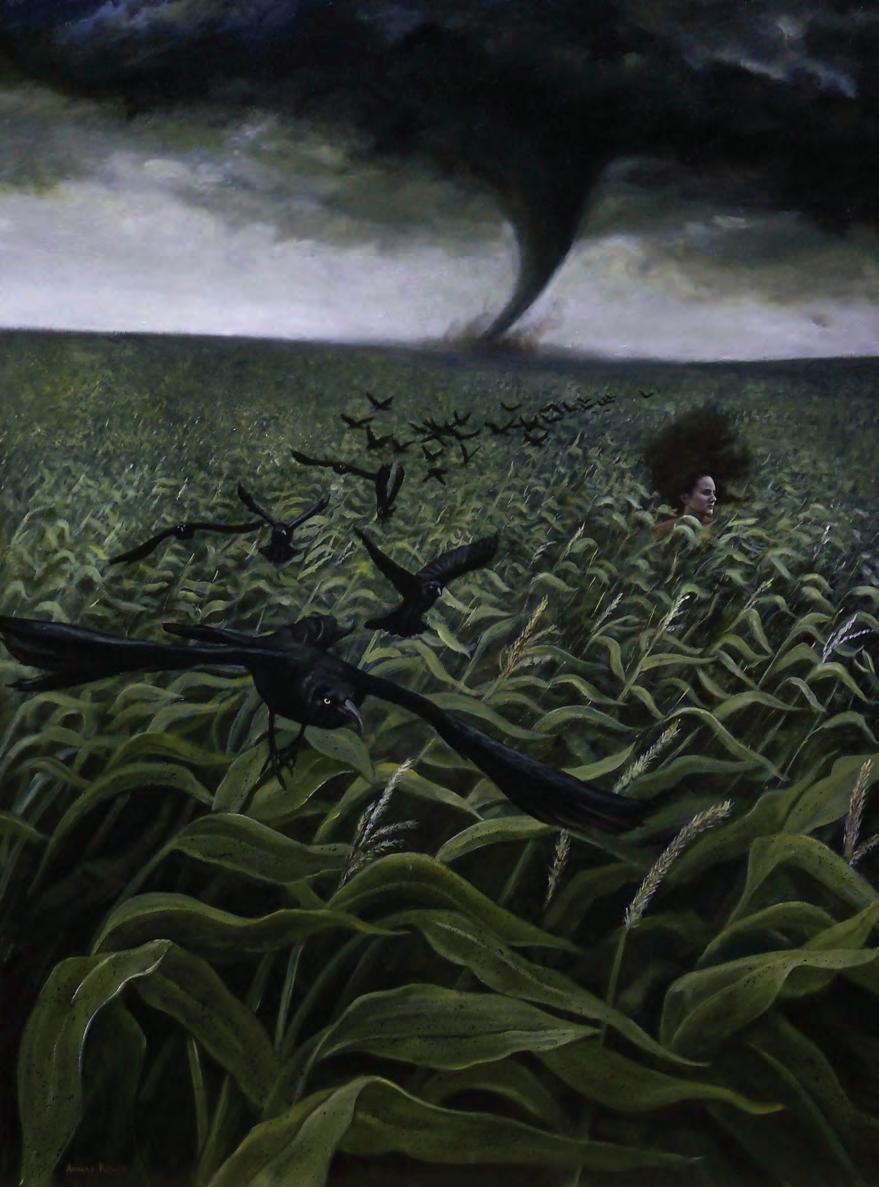 In The Path of The Wind, 2009
Acrylic on Canvas, 40 x 30 in.
In The Path of The Wind, 2009
Acrylic on Canvas, 40 x 30 in.
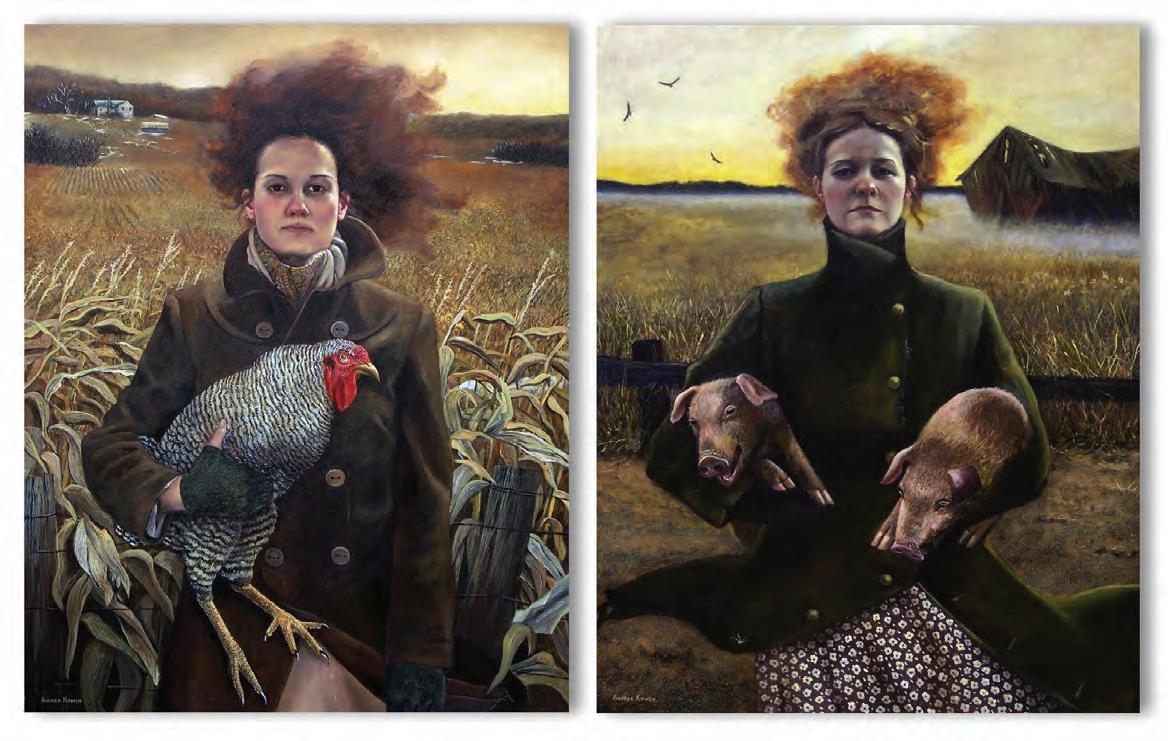 Two Rural Sisters, 2009 Acrylic on Canvas, Diptych, 28 x 44 in.
Two Rural Sisters, 2009 Acrylic on Canvas, Diptych, 28 x 44 in.
Marsh Hare, 2010
Acrylic on Canvas, 30 x 30 in.
Collection of Jeffrey and Irene Anschlowar
Opposite: Queen Anne’s Lace, 2010
Acrylic on Canvas, 30 x 24 in.
Collection of Laurie and Todd Lonergan
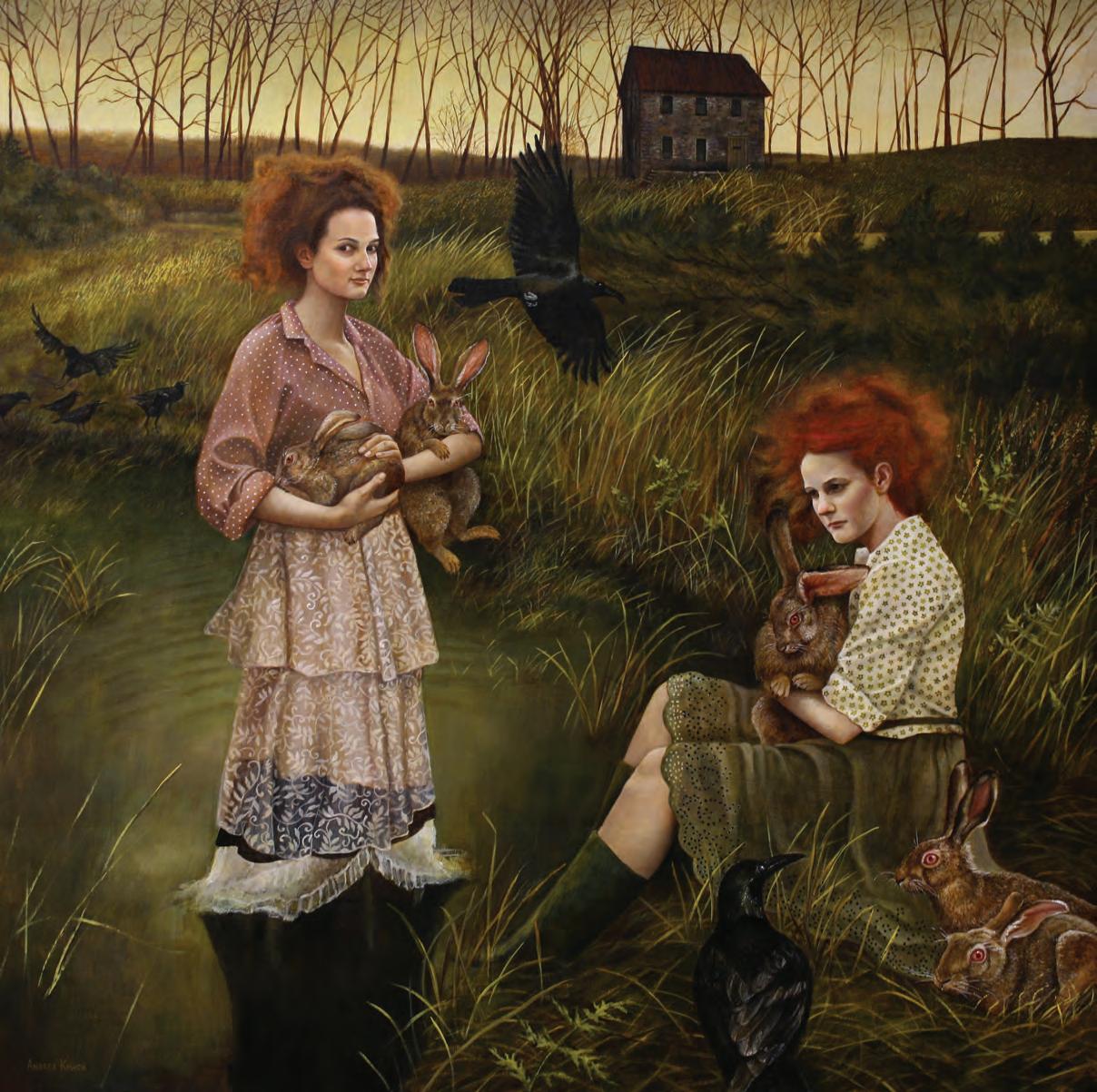
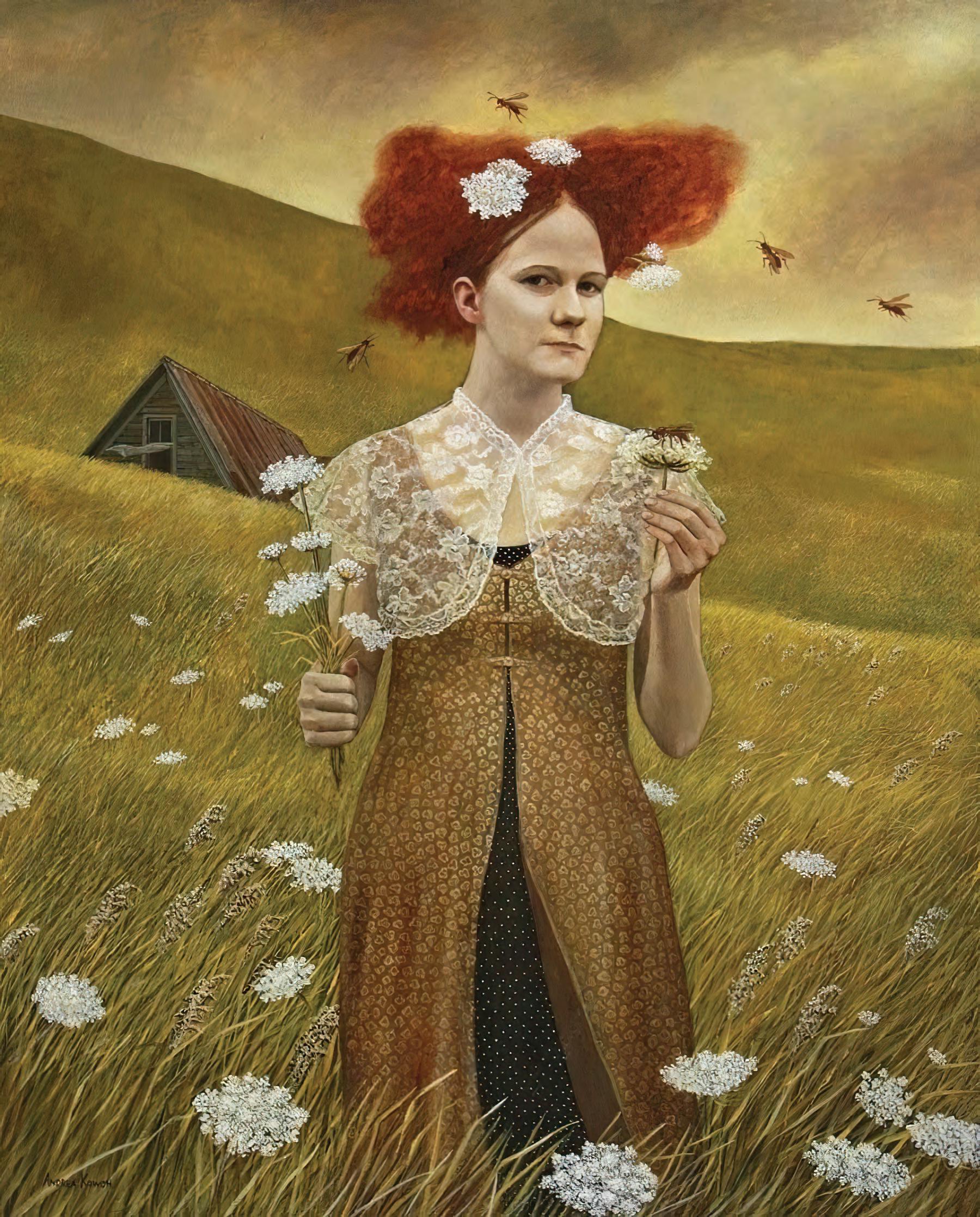
Above: The Catch, 2010
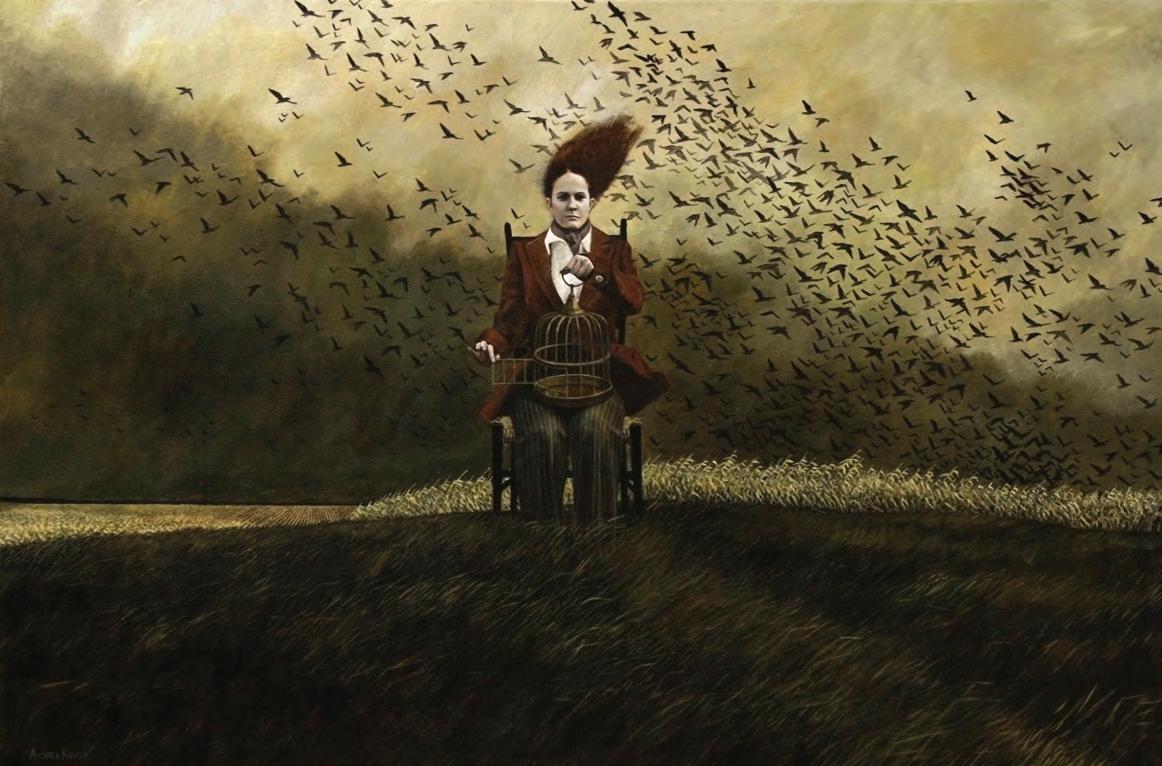
Acrylic on Canvas, 24 x 36 in.
Fairview, North Carolina
Opposite: The Feast, 2010
Acrylic on Canvas, 60 x 84 in.
Collection of Leslie and Barbara Norman
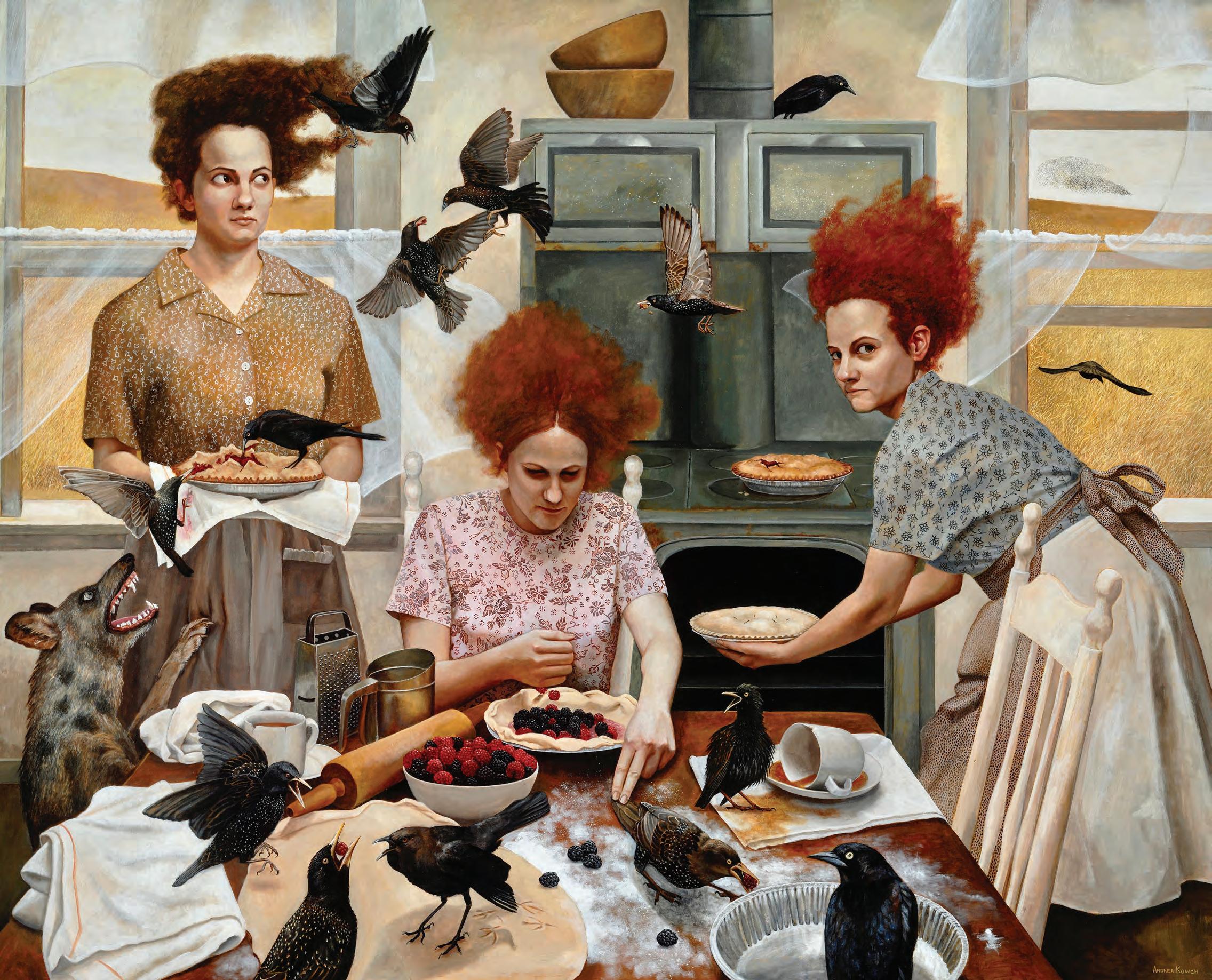
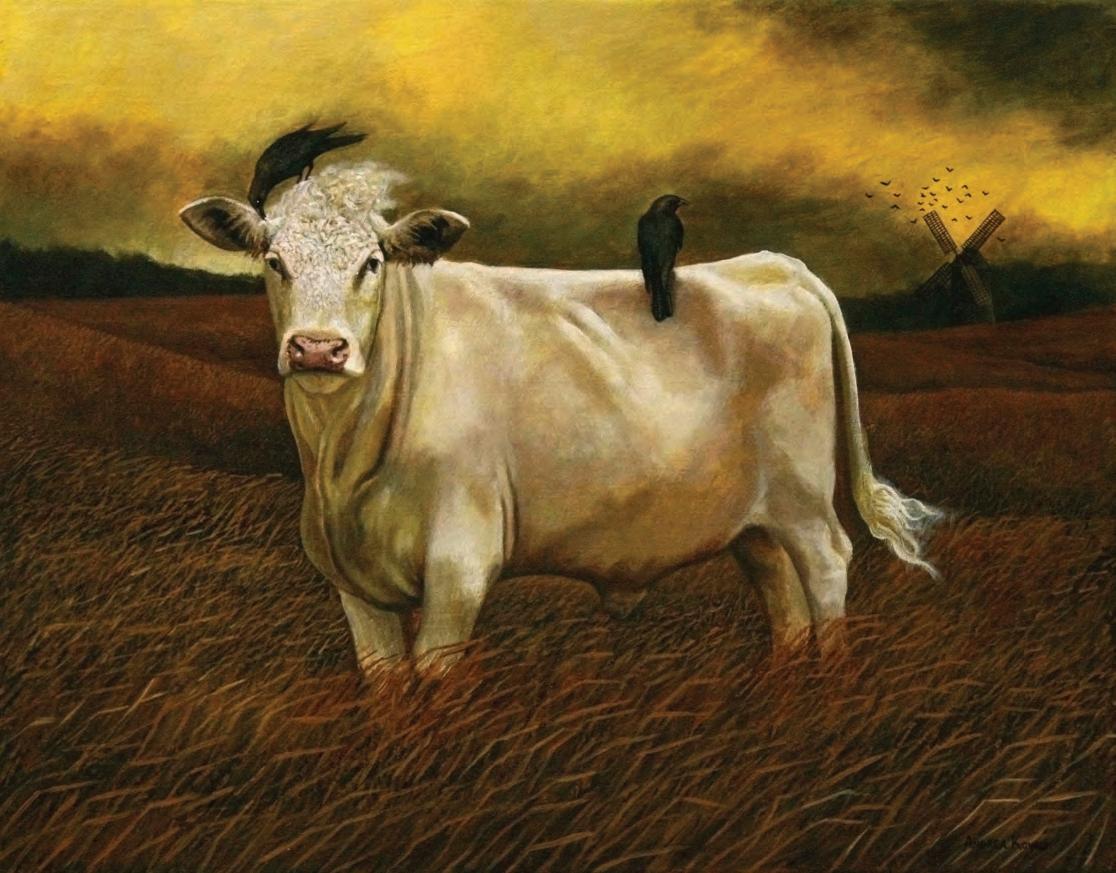 Above: Watchful Eye, 2010 Acrylic on Canvas, 16 x 20 in. Collection of Elizabeth and Michael DeLesia
Above: Watchful Eye, 2010 Acrylic on Canvas, 16 x 20 in. Collection of Elizabeth and Michael DeLesia
 Crow’s Song, 2011
Acrylic on Canvas, 48 x 36 in.
Crow’s Song, 2011
Acrylic on Canvas, 48 x 36 in.

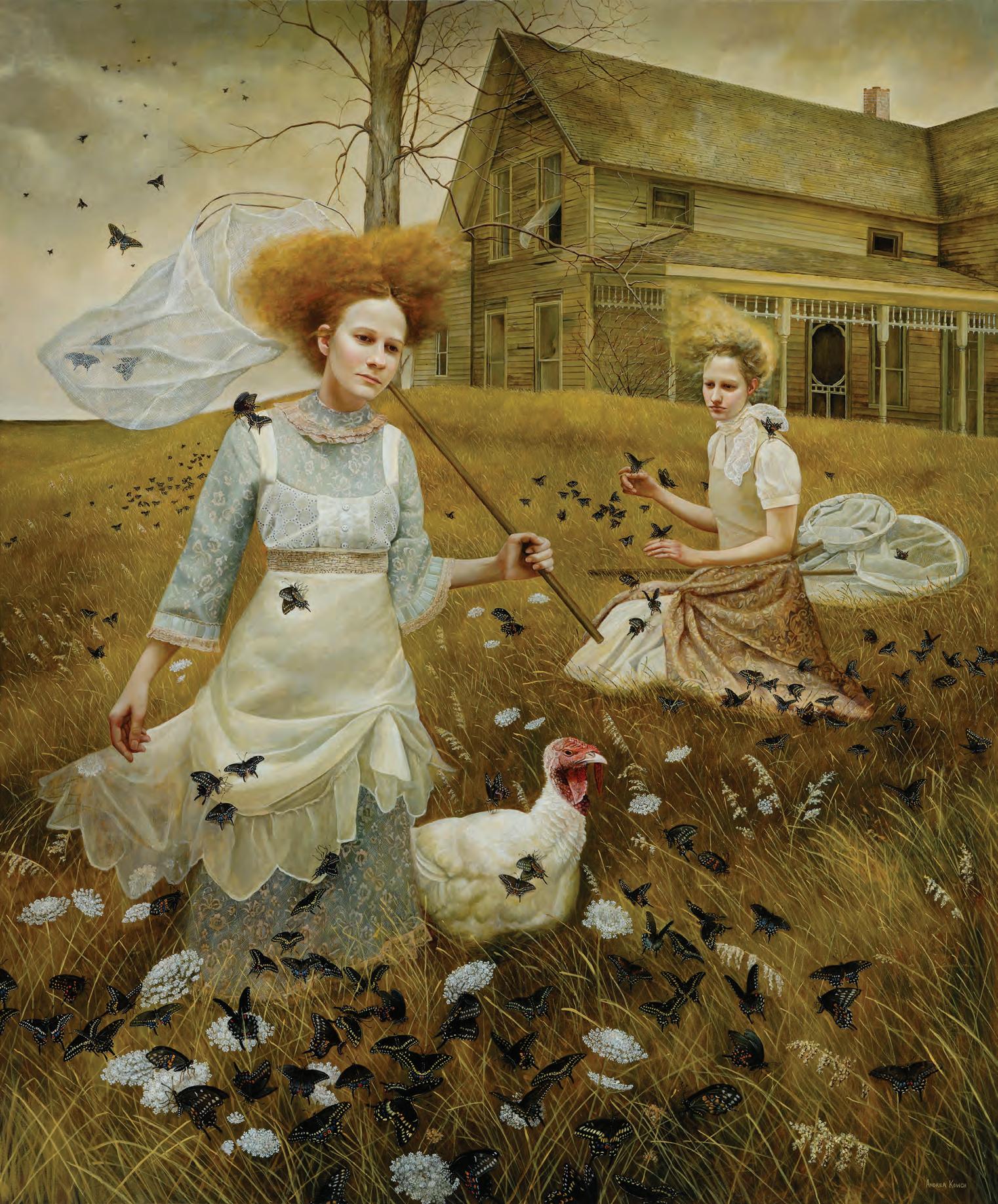
Above: Tempest, 2011
Acrylic on Canvas, 30 x 24 in.
Collection of Richard J. Demato
Opposite: Sojourn, 2011
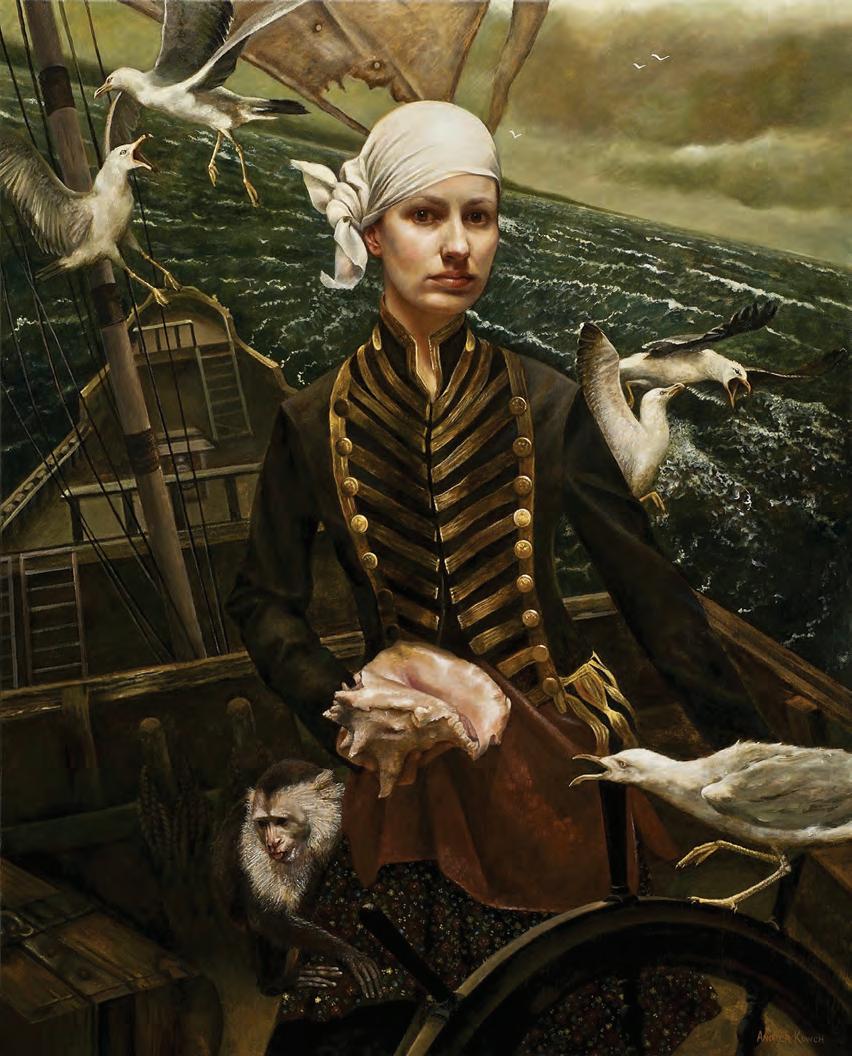
Acrylic on Canvas, 72 x 60 in.
Grand Rapids Art Museum
Museum Purchase Booth Collection, 2012.52
 The Travelers, 2011
Acrylic on Canvas, 36 x 36 in.
The Travelers, 2011
Acrylic on Canvas, 36 x 36 in.
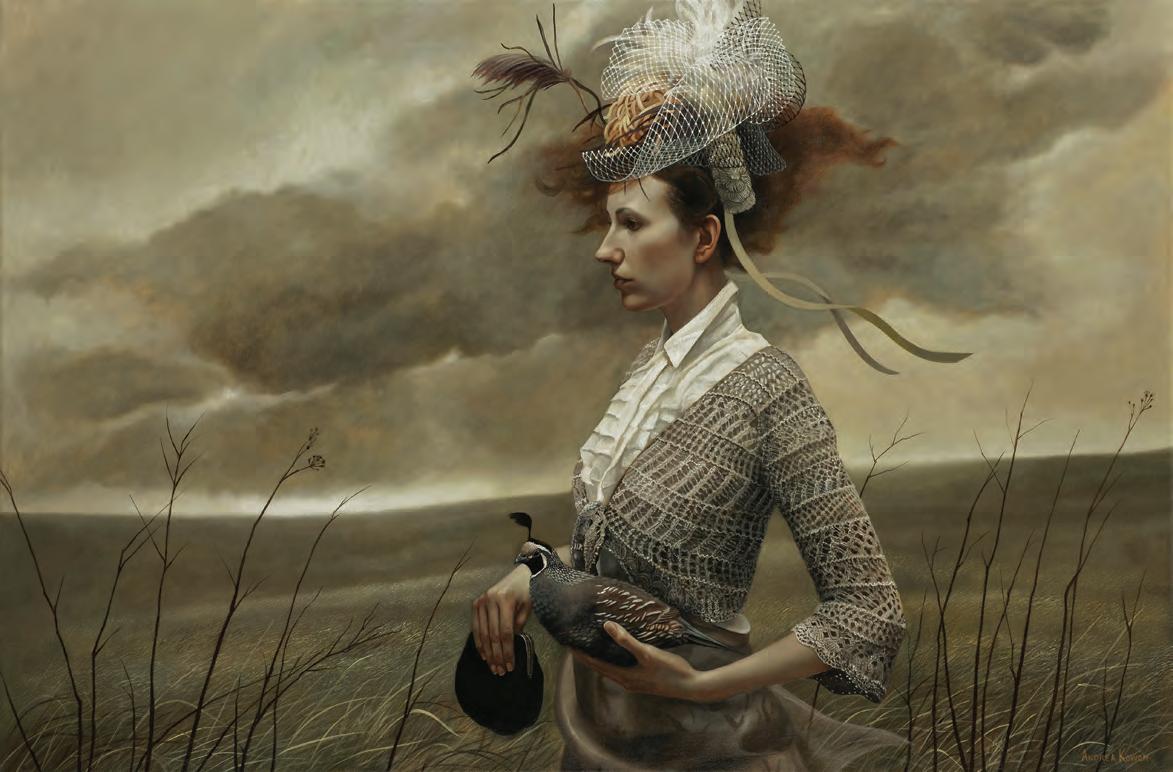
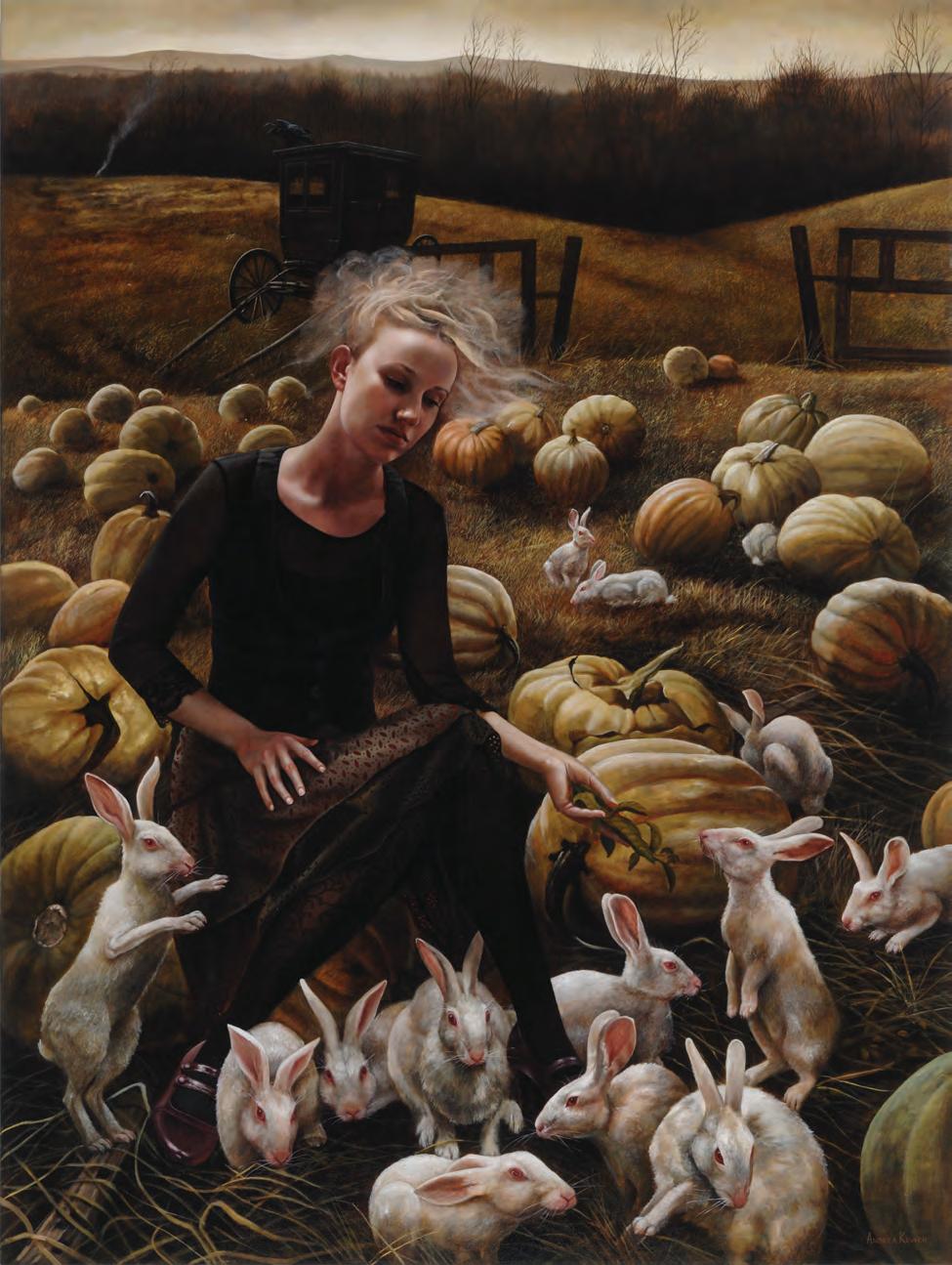

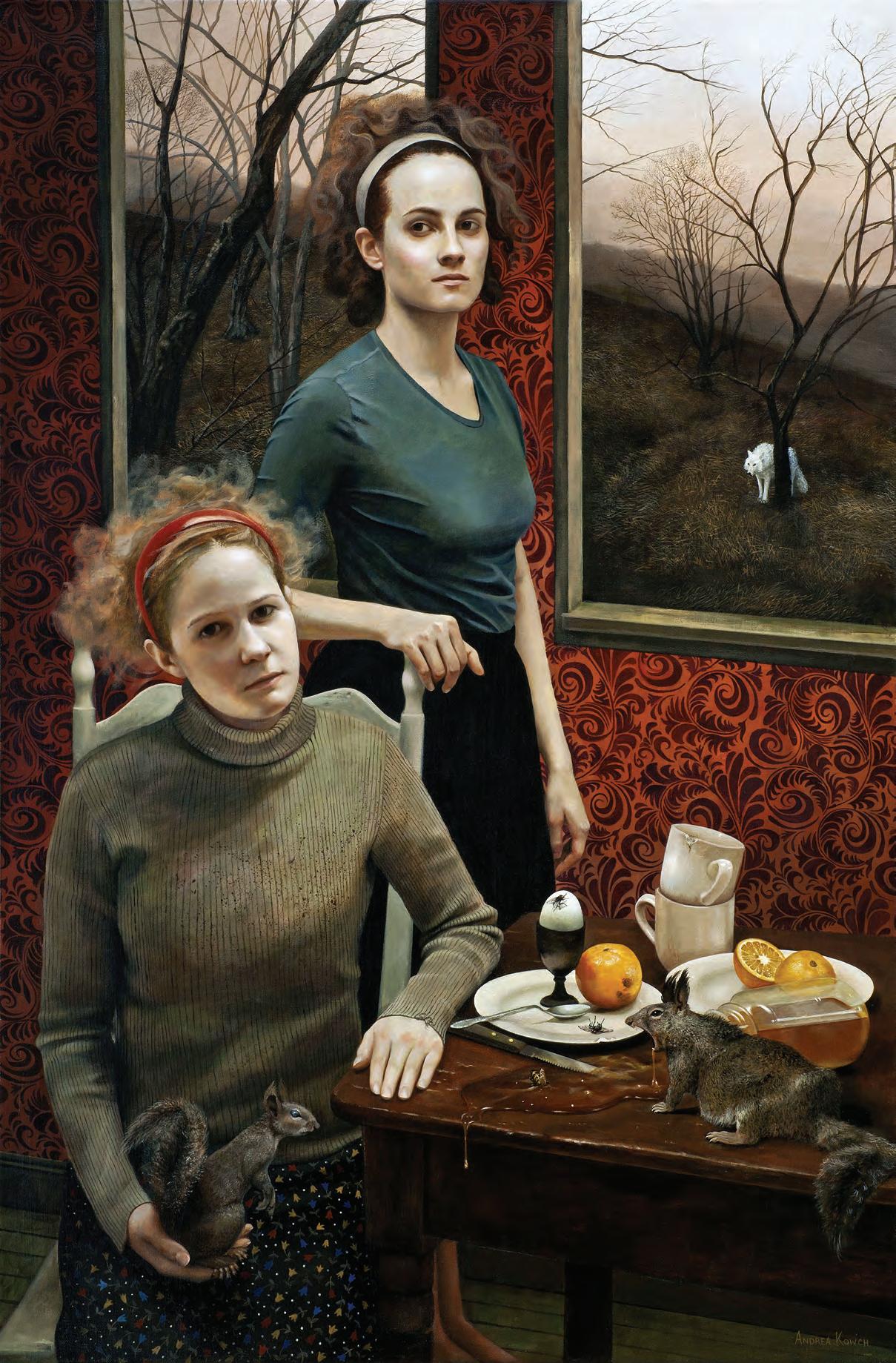
Above:
Opposite: The Sentinel, 2012 Acrylic on Canvas, 36 x 24 in. Private Collection
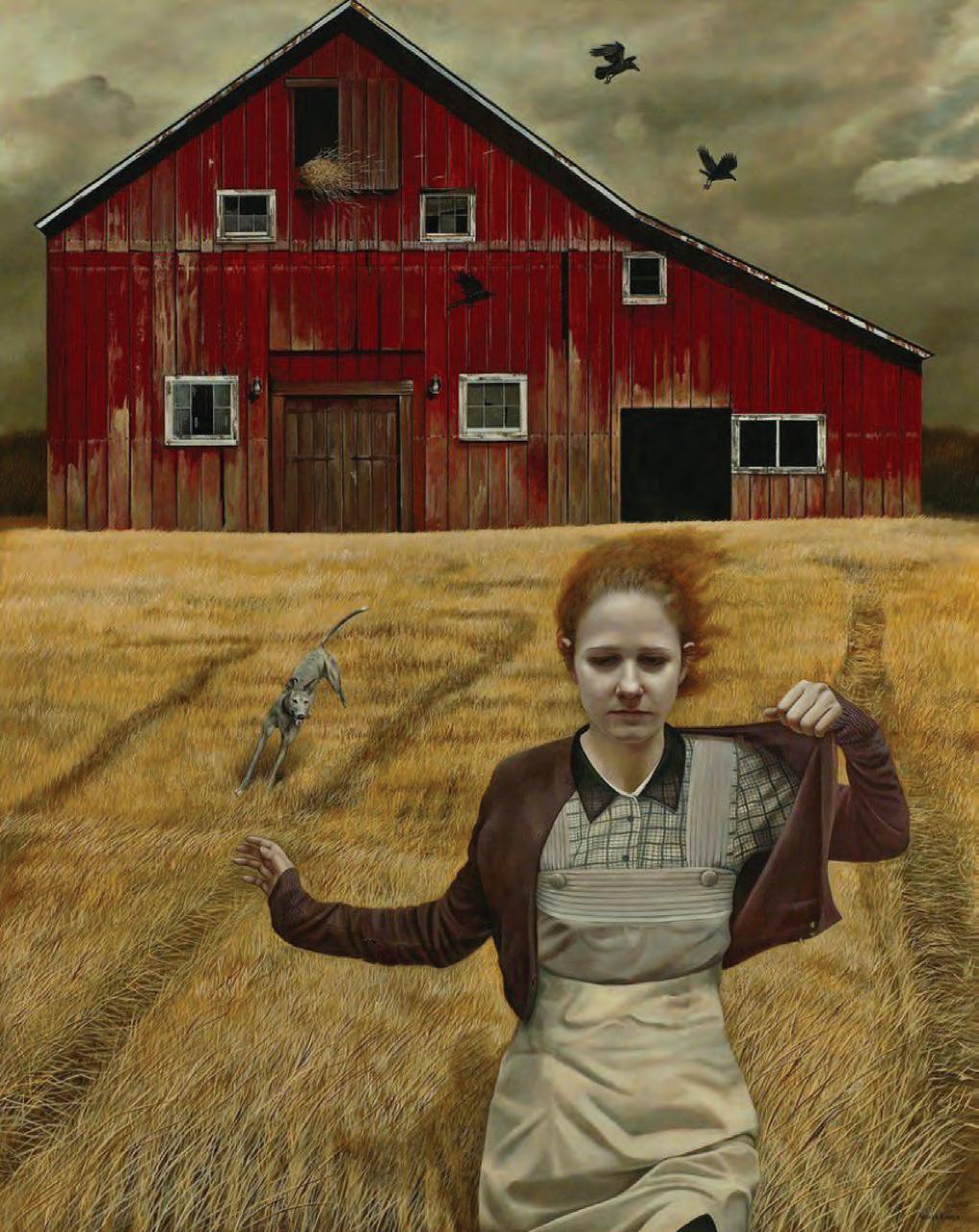 Dream Chaser, 2013 Acrylic on Canvas, 60 x 48 in. Courtesy of The Bennett Collection of Women Realists San Antonio, Texas
Dream Chaser, 2013 Acrylic on Canvas, 60 x 48 in. Courtesy of The Bennett Collection of Women Realists San Antonio, Texas
 The Merry Wanderers, 2013 Acrylic on Canvas, 24 x 36 in.
Collection of Leslie and Barbara Norman Fairview, North Carolina
The Merry Wanderers, 2013 Acrylic on Canvas, 24 x 36 in.
Collection of Leslie and Barbara Norman Fairview, North Carolina


Above: Far Away, 2014 Acrylic on Canvas, 30 x 24 in.
Private Collection
Opposite: The Strand, 2013 Acrylic on Canvas, 30 x 24 in. Collection of Robert Kalimian
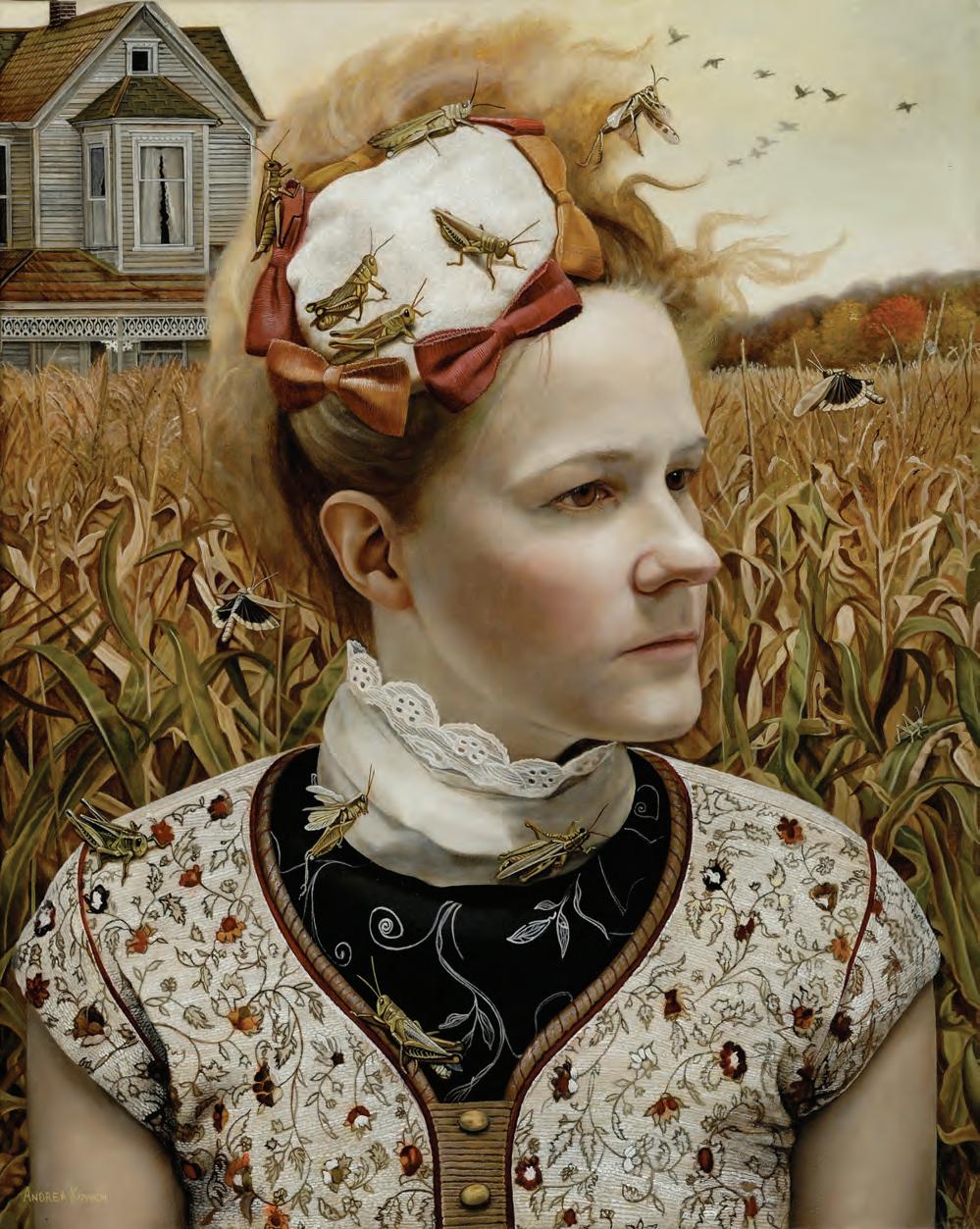
Above: My Heart Beside, 2014
Acrylic on Canvas, 30 x24 in.
Collection of Leslie and Barbara Norman
Fairview, North Carolina
Opposite: Her Thoughts They Hum, 2014
Acrylic on Canvas, 30 x 24 in. Private Collection
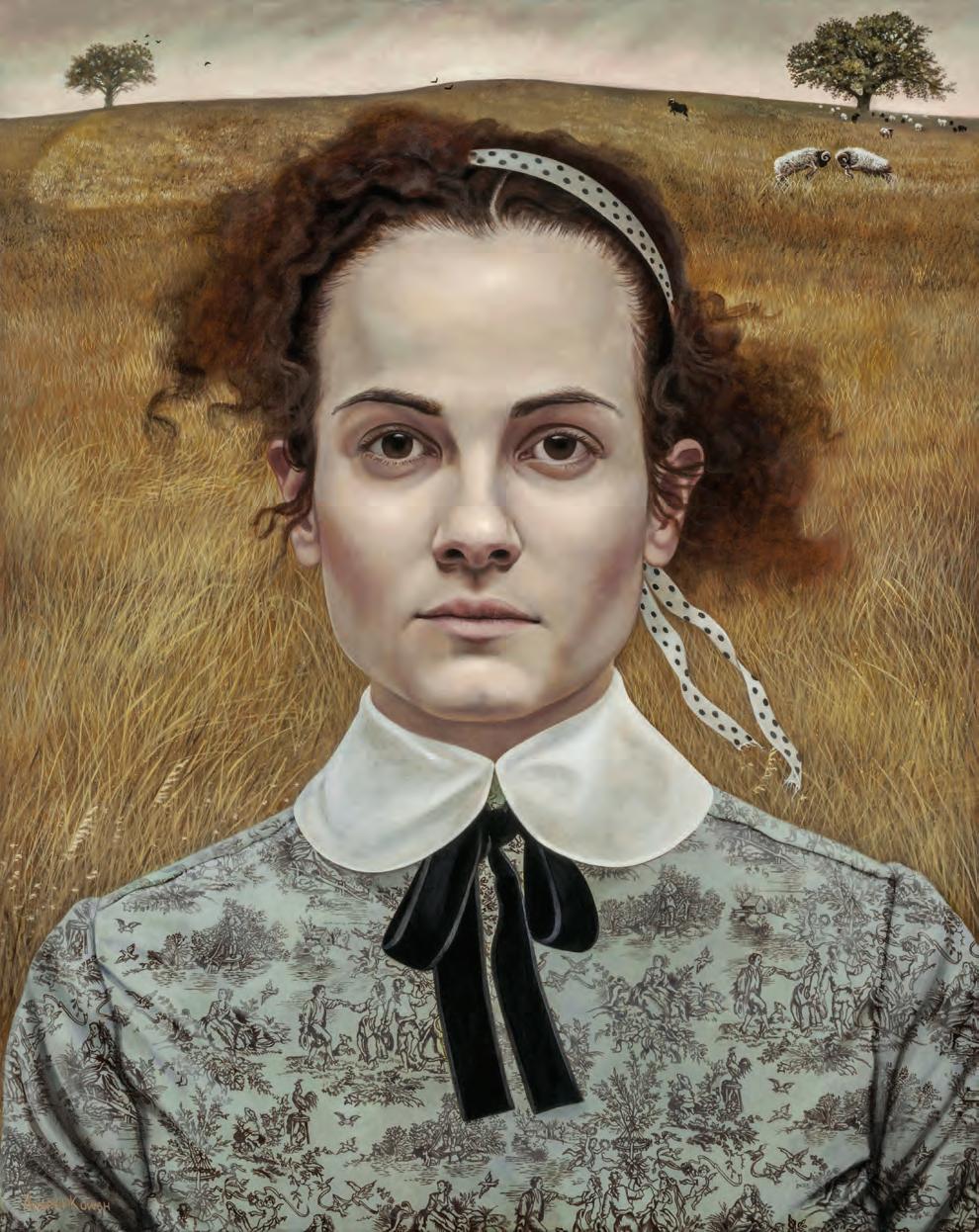
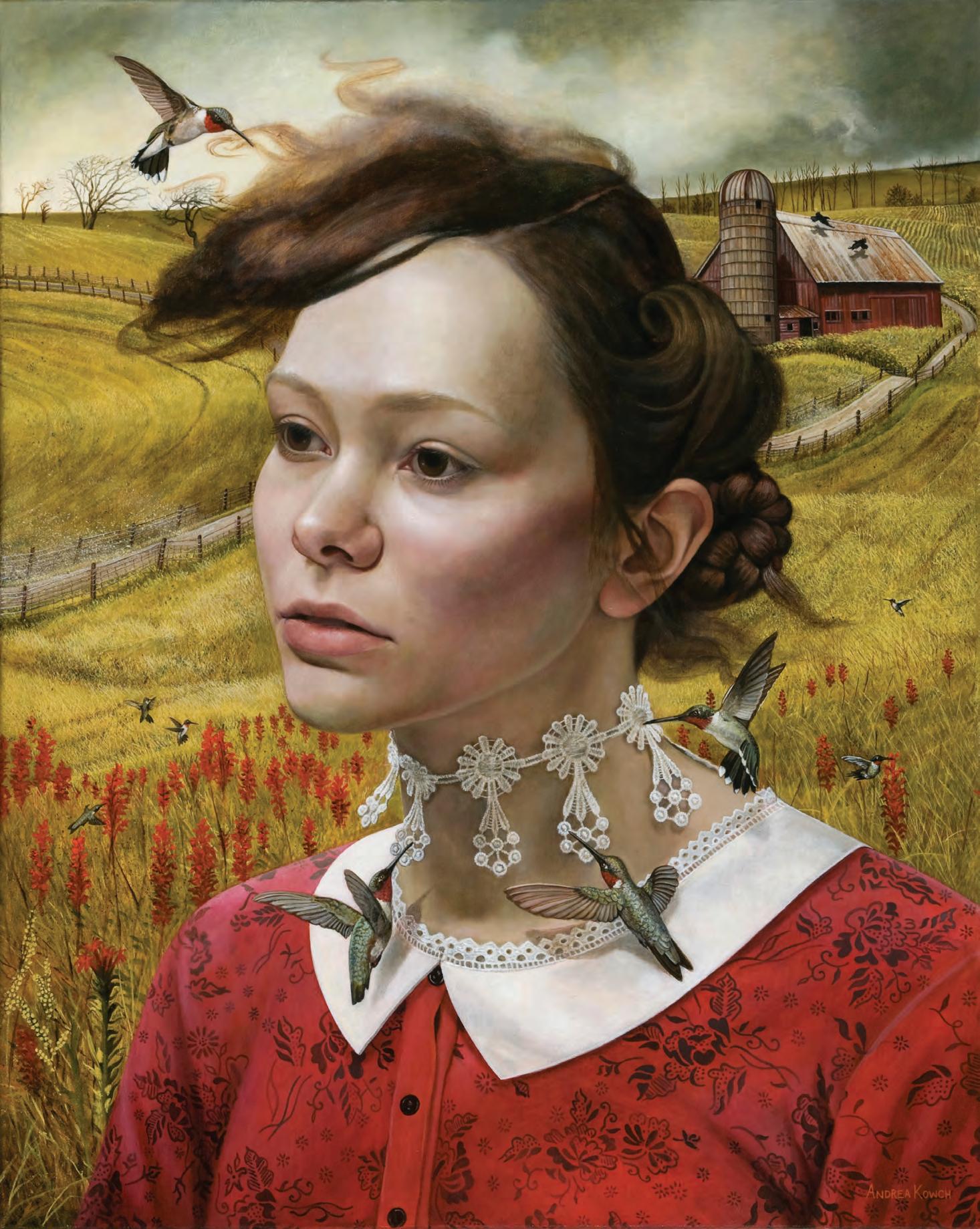
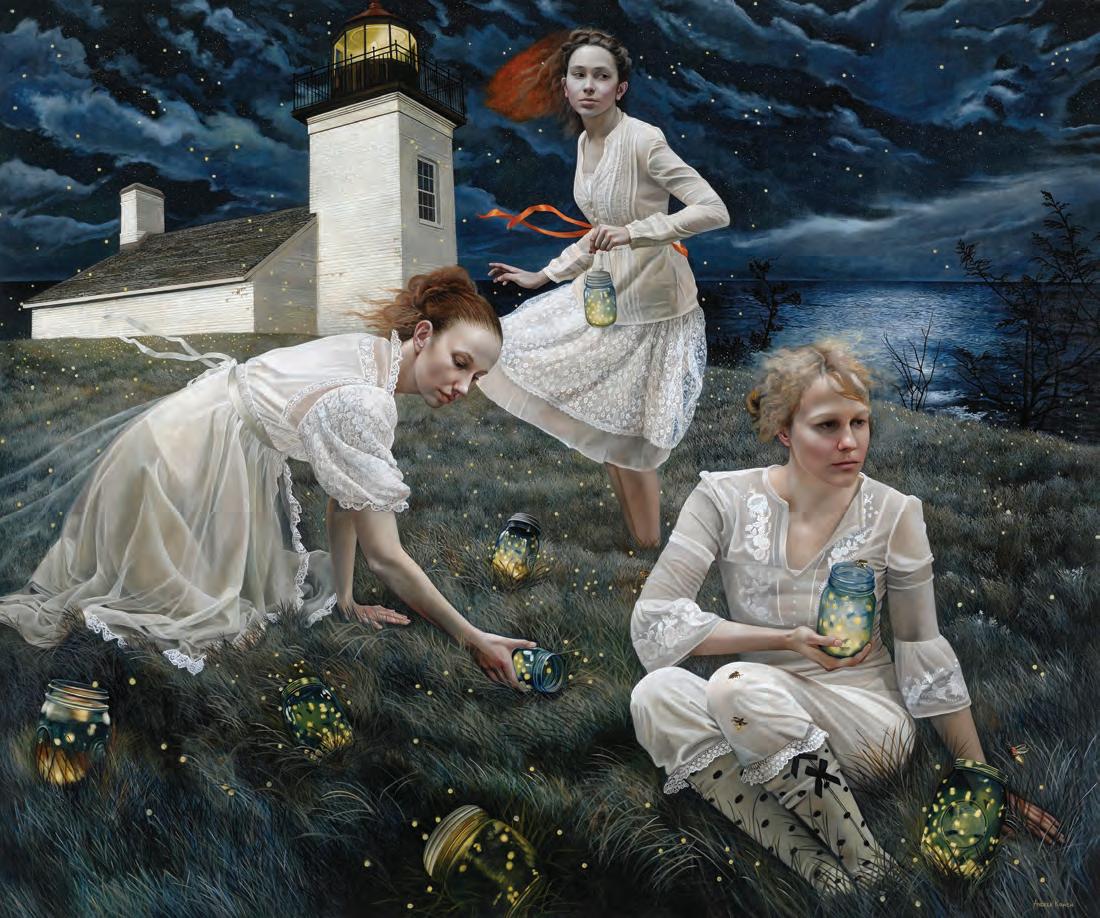 Acrylic on Canvas, 60 x 72 in.
Acrylic on Canvas, 60 x 72 in.
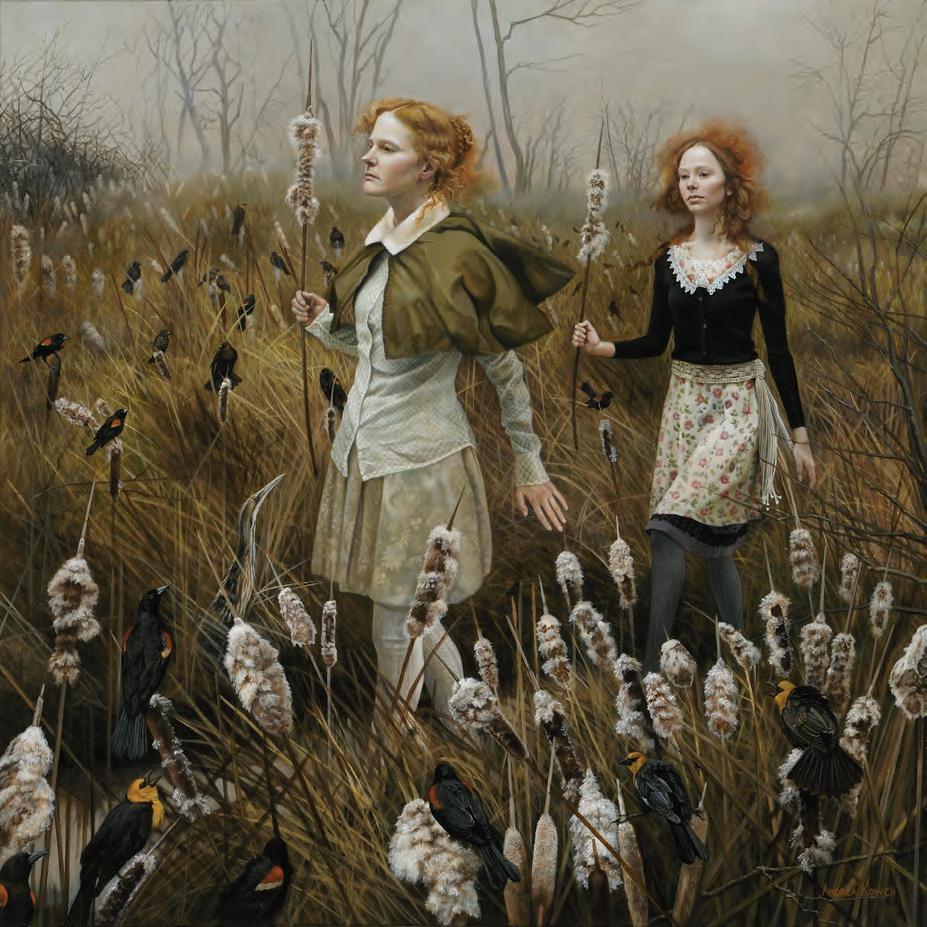
 Dawning, 2015
Dawning, 2015
 In The Distance, 2015 Acrylic on Canvas, 36 x 36 in.
In The Distance, 2015 Acrylic on Canvas, 36 x 36 in.
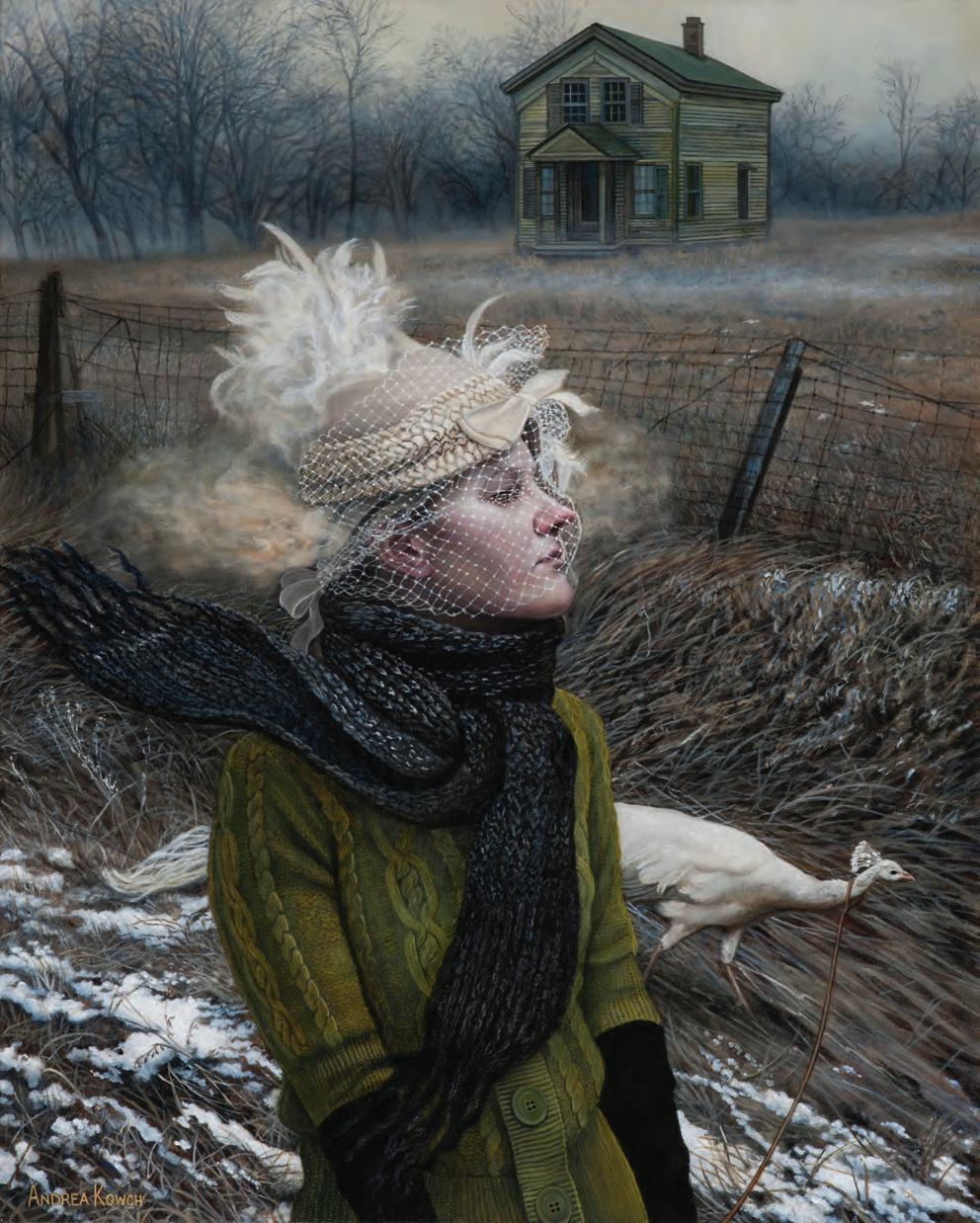 The Road She Walks, 2015
Acrylic on Canvas, 20 x 16 in.
The Road She Walks, 2015
Acrylic on Canvas, 20 x 16 in.
Through The Boughs, 2015 Acrylic on Canvas, 30 x 24 in. Collection of the Muskegon Museum of Art Museum purchase, through the gift of Don Holtrop In memory of his wife, Carol J. Holtrop
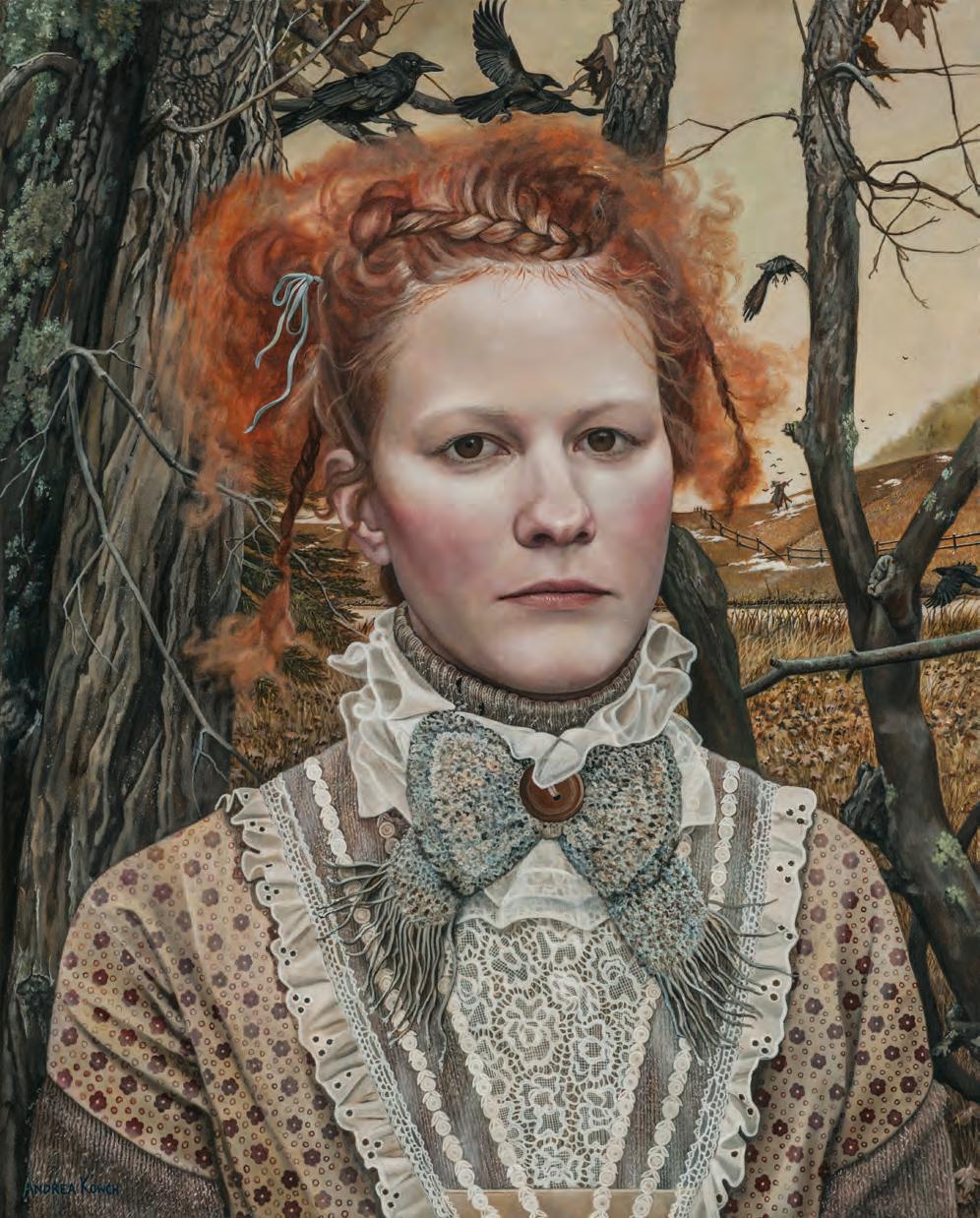
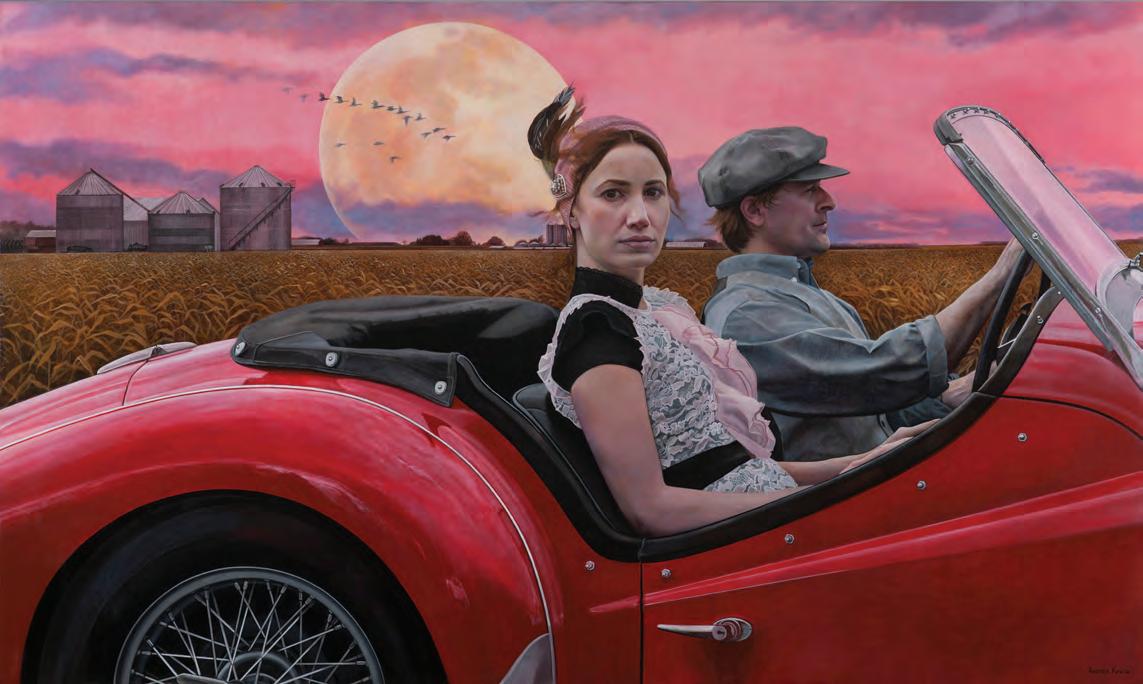 Chasing the Moon, 2016
Acrylic on Canvas, 36 x 60 in.
Chasing the Moon, 2016
Acrylic on Canvas, 36 x 60 in.
Gust, 2016
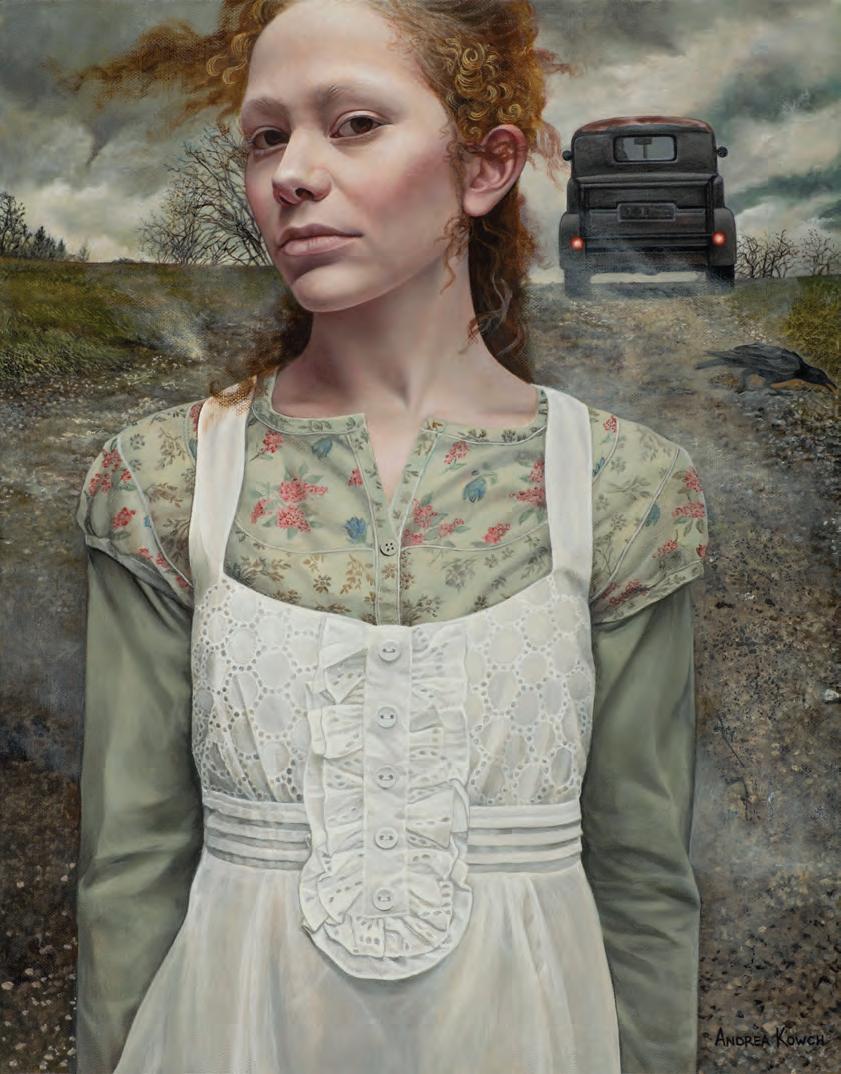
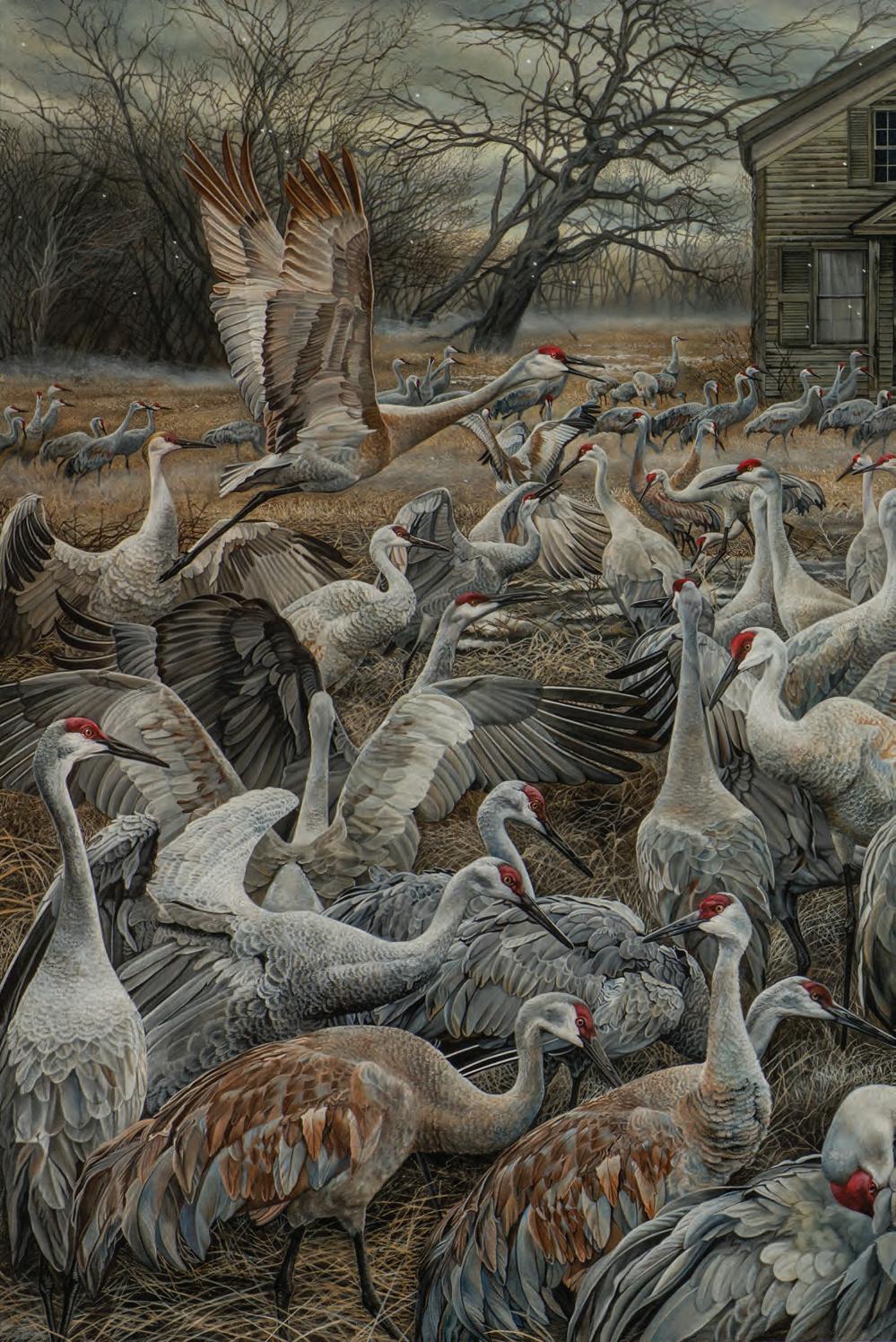 The Courtiers, 2016
Acrylic on Canvas, 36 x 60 in.
The Courtiers, 2016
Acrylic on Canvas, 36 x 60 in.


Above: In My Mind, 2017
Acrylic on Canvas, 36 x 48 in.
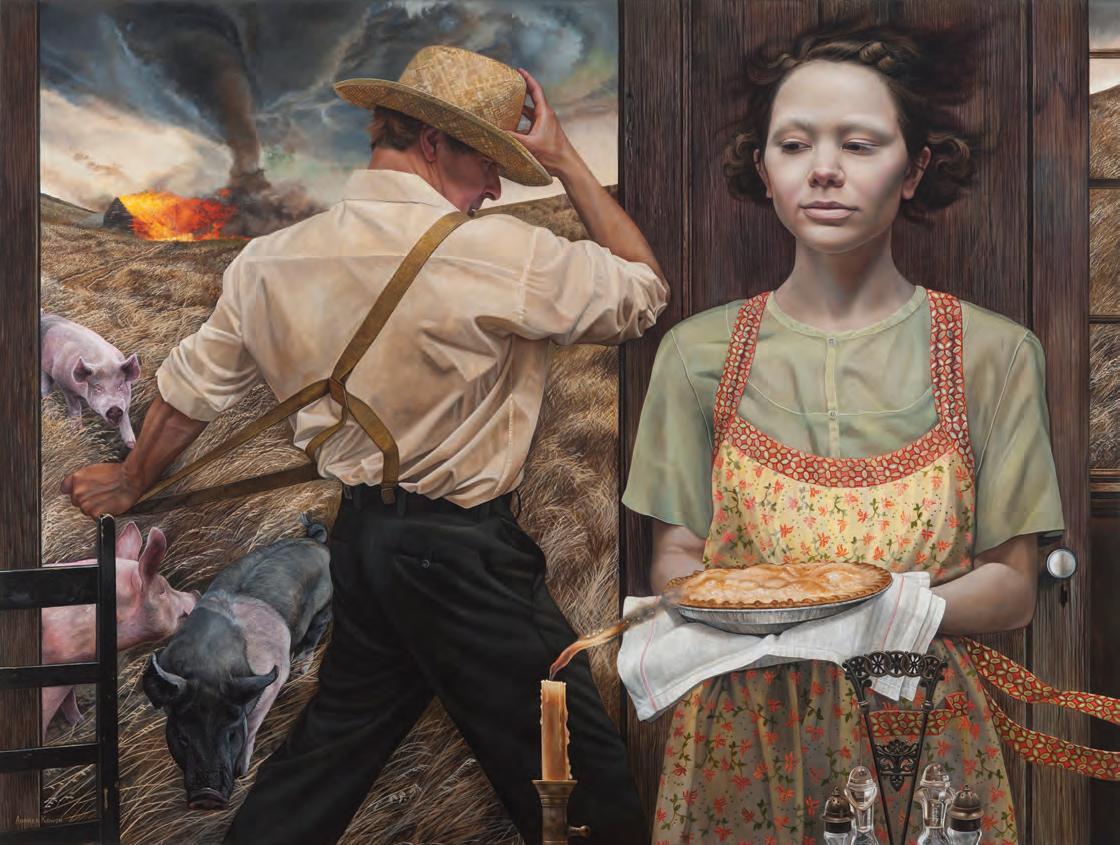
Collection of Robert Kalimian
Opposite: Flame, 2017
Acrylic on Canvas, 10 x 10 in.
Collection of Dr. Frederick Corio and Laura Stephan-Corio
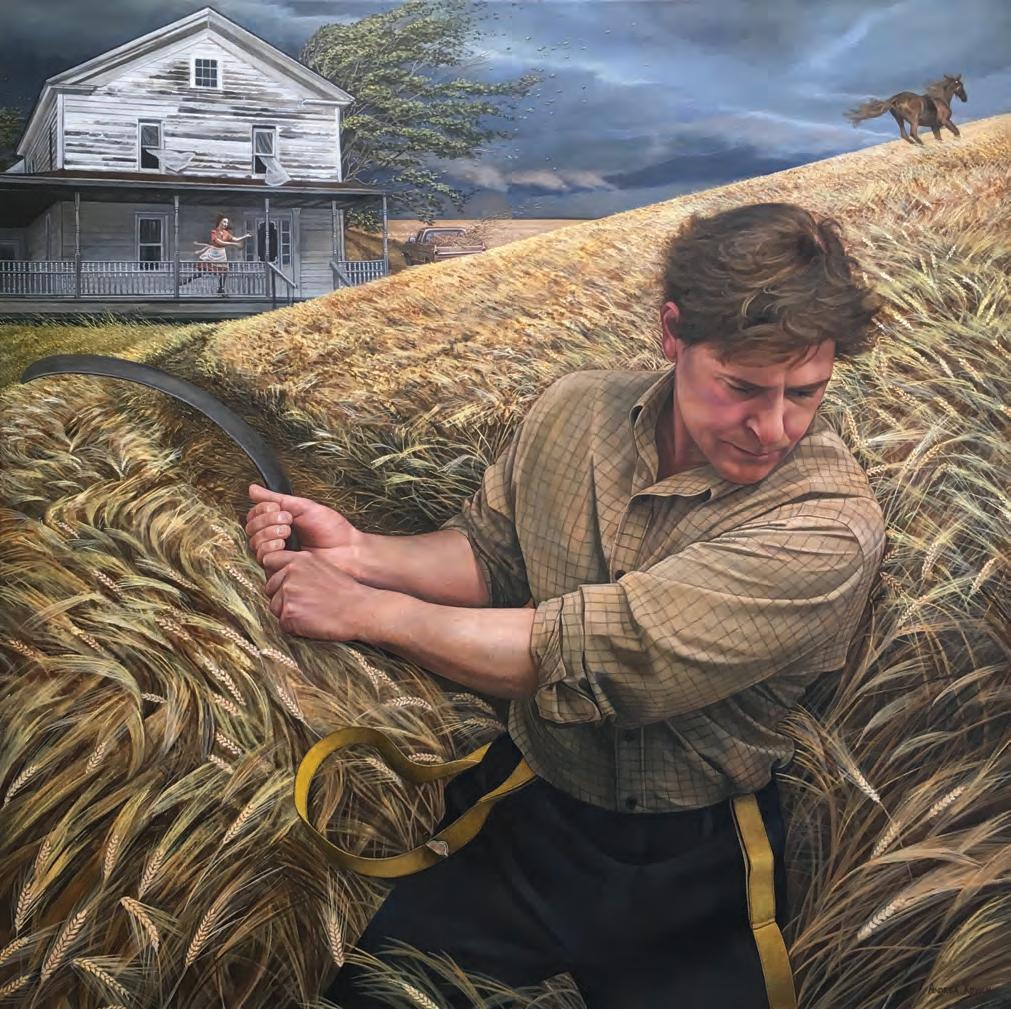 Runaway, 2017
Acrylic on Canvas, 30 x 30 in.
Runaway, 2017
Acrylic on Canvas, 30 x 30 in.
Flight, 2018
Fairview, North Carolina
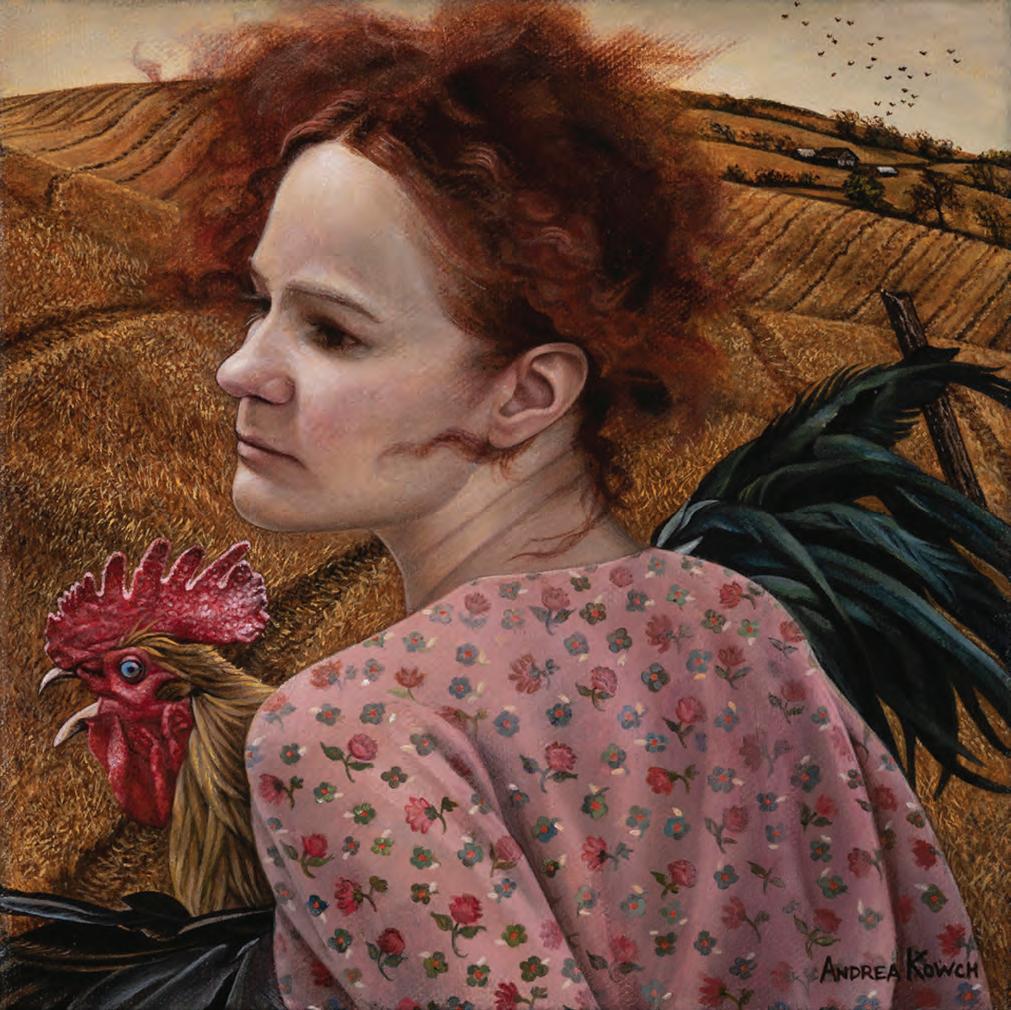 Acrylic on Canvas, 8 x 8 in.
Collection of Leslie and Barbara Norman
Acrylic on Canvas, 8 x 8 in.
Collection of Leslie and Barbara Norman
Above: Reunion, 2018
Acrylic on Canvas, 36 x 36 in.
Private Collection
Opposite: Solitude, 2018
Acrylic on Canvas, 36 x 24 in.
Private Collection
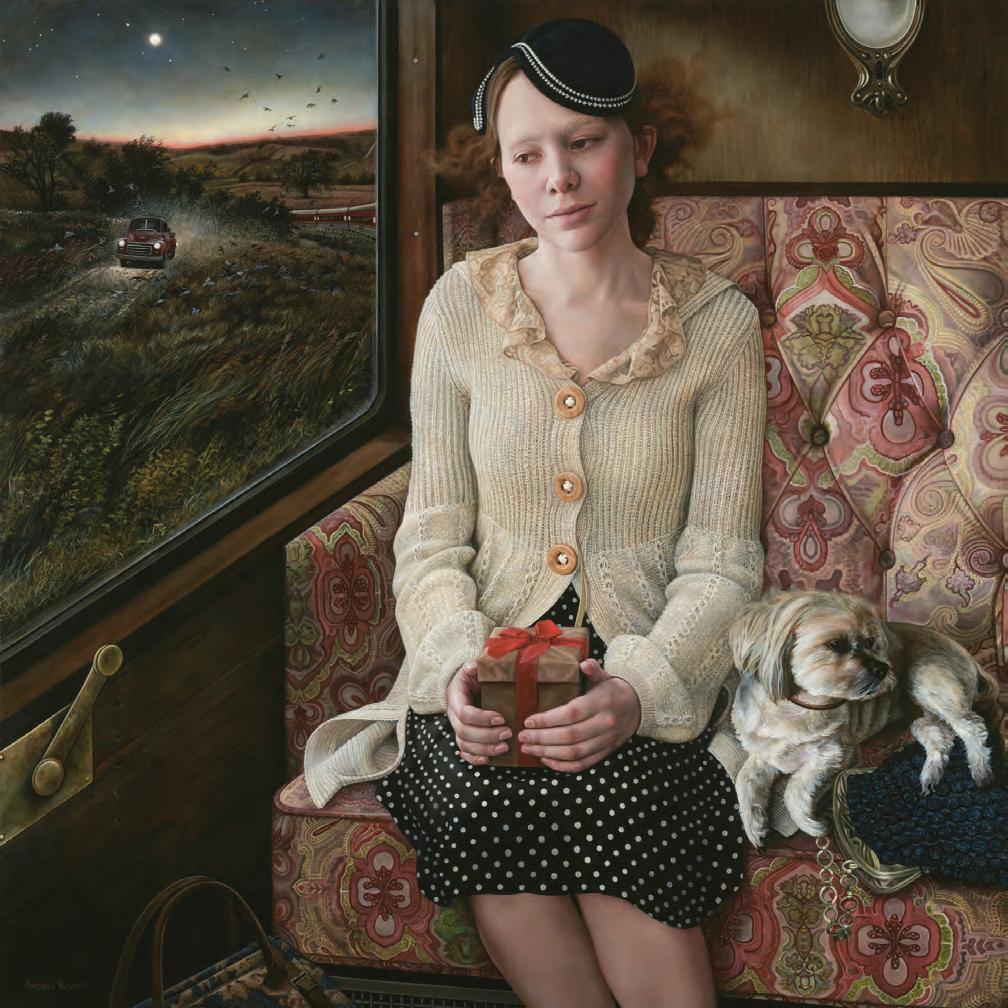
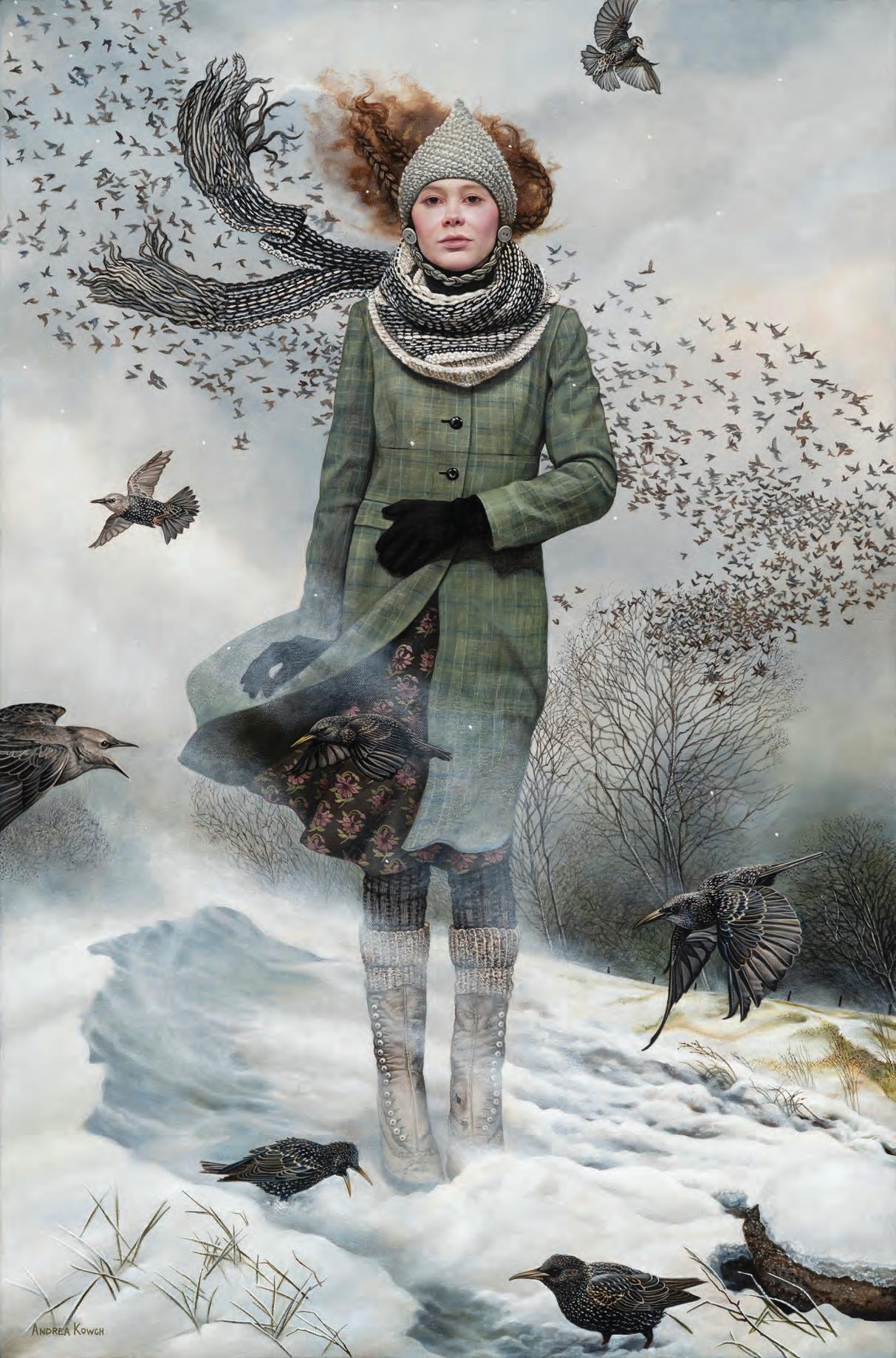
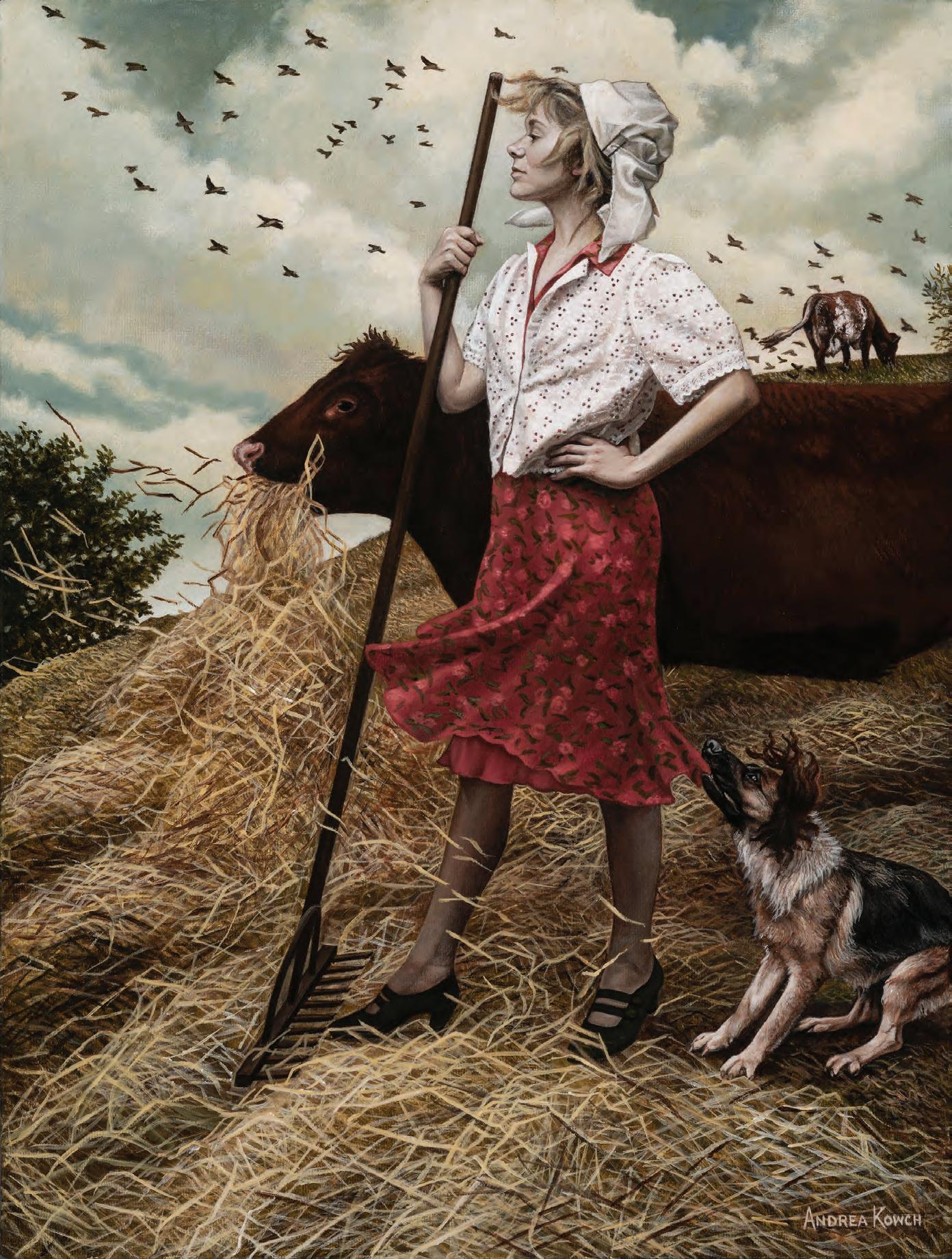
Above: Expectation, 2019
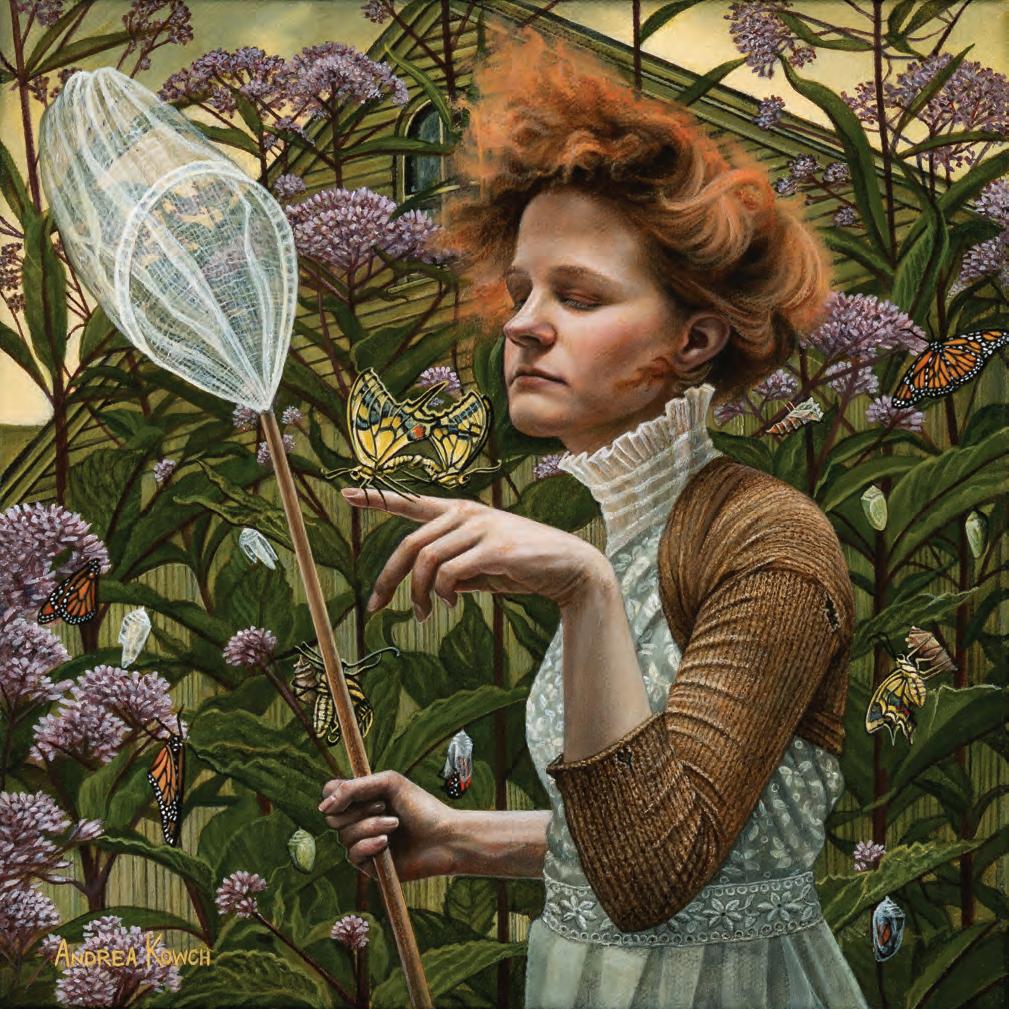
Acrylic on Canvas, 10 x 10 in.
Collection of Jennifer Pruess
Opposite: Steadfast, 2019
Acrylic on Linen, 16 x 12 in.
Collection of Pam and Don Schneider
 Soiree, 2019
Acrylic on Canvas, 24 x 36 in.
Soiree, 2019
Acrylic on Canvas, 24 x 36 in.
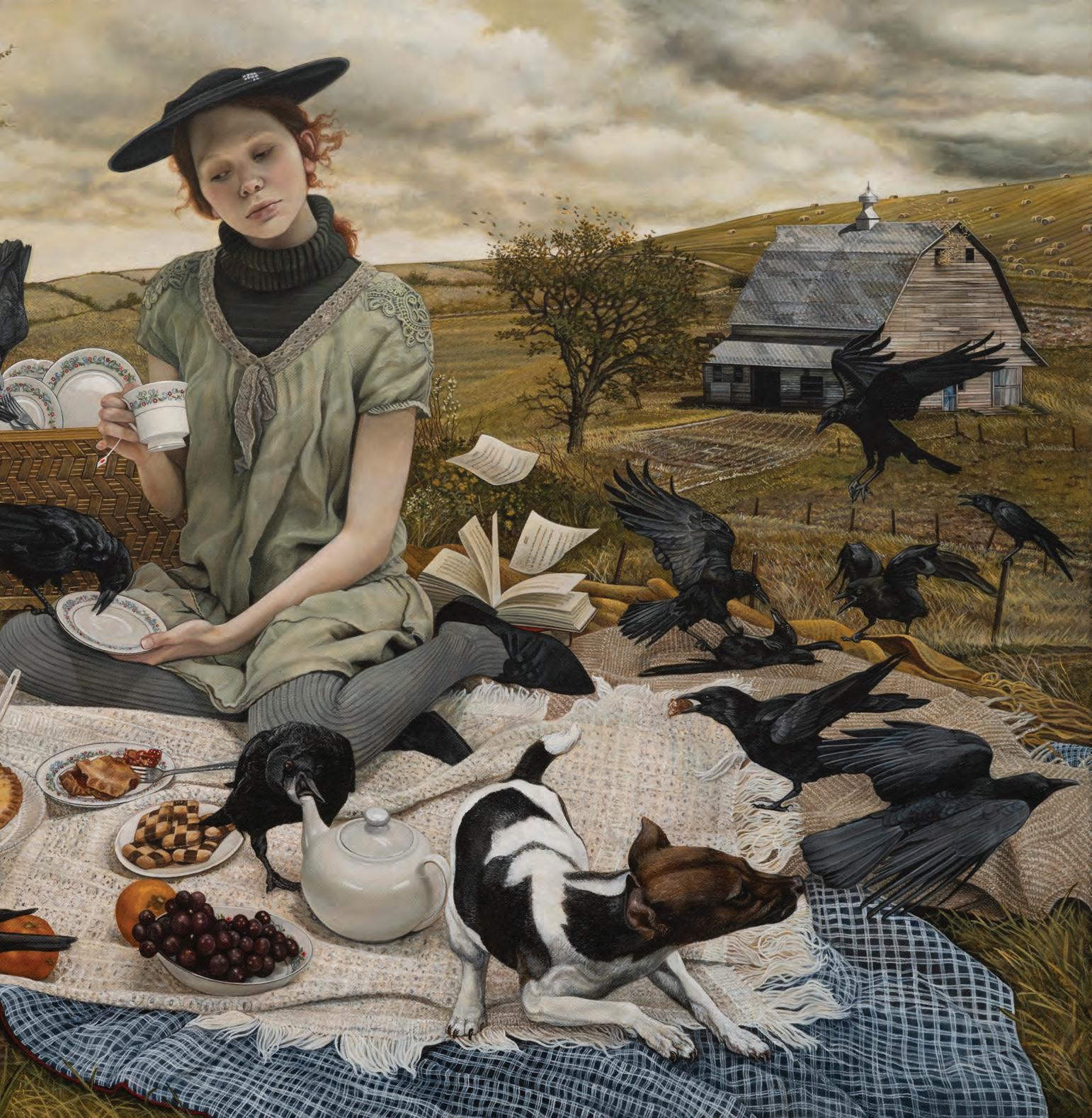

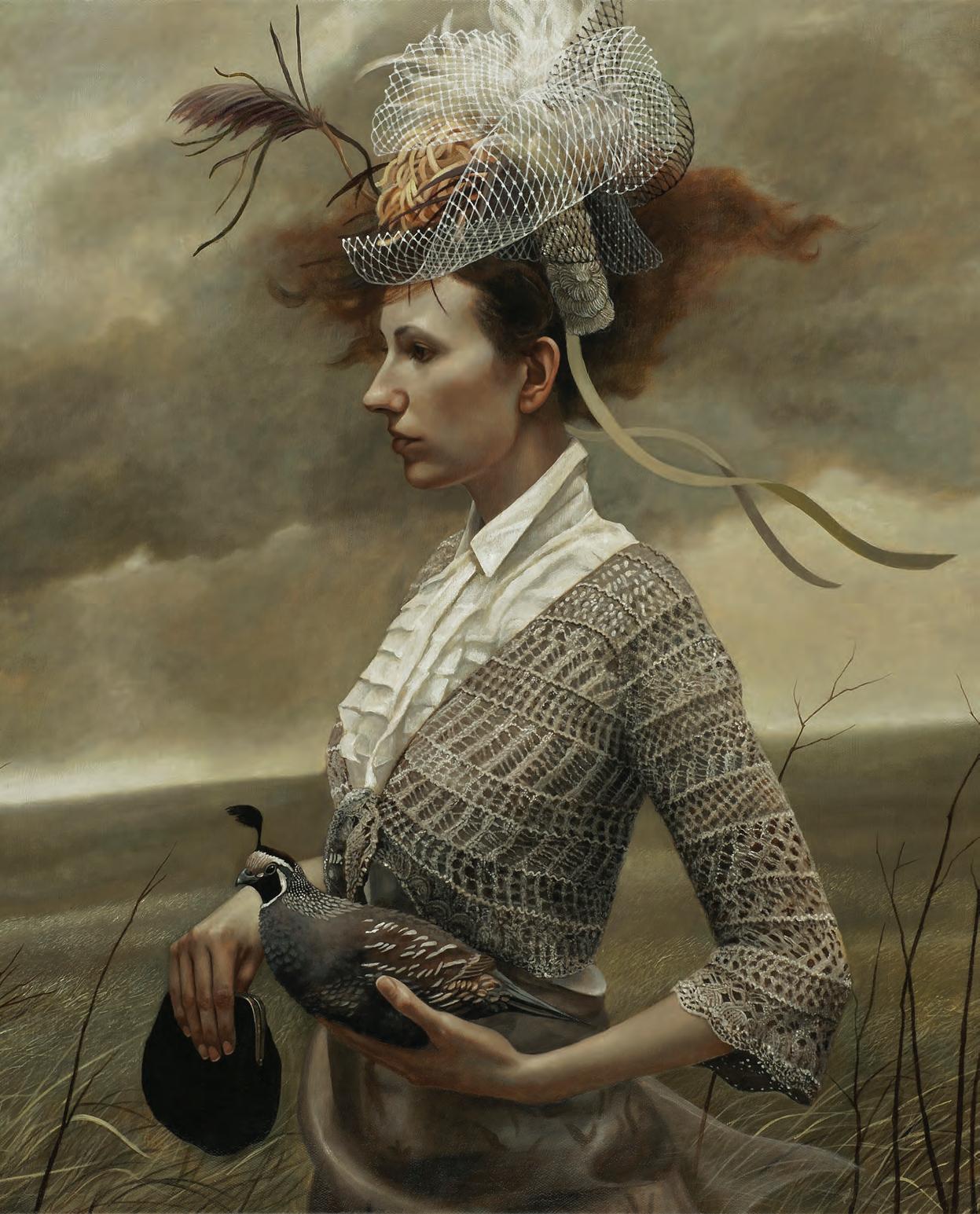
Apple of My Eye, 2009, Acrylic on Canvas, 30 x 40 in., Private Collection
Blackbirds Are Gathering, 2007, Acrylic on Canvas, 24 x 36 in., Collection of Debbie Scheys
Chasing the Moon, 2016, Acrylic on Canvas, 36 x 60 in., Collection of Robert Kalimian
Crow’s Song, 2011, Acrylic on Canvas, 48 x 36 in., Collection of Marilyn Kornmesser
Dawning, 2015, Acrylic on Canvas, 14 x 11 in., Private Collection
Dream Chaser, 2013, Acrylic on Canvas, 60 x 48 in., Courtesy of The Bennett Collection of Women Realists, San Antonio, Texas
Expectation, 2019, Acrylic on Canvas, 10 x 10 in., Collection of Jennifer Pruess
Far Away, 2014, Acrylic on Canvas, 30 x 24 in., Private Collection
Flame, 2017, Acrylic on Canvas, 10 x 10 in., Collection of Dr. Frederick Corio and Laura Stephan-Corio
Flight, 2018, Acrylic on Canvas, 8 x 8 in., Collection of Leslie and Barbara Norman, Fairview, North Carolina
Gust, 2016, Acrylic on Linen, 18 x 14 in., Collection of Laurie and Todd Lonergan
Her Fancy, 2012, Acrylic on Canvas, 24 x 36 in., Collection of Marilyn Kornmesser
Her Thoughts They Hum, 2014, Acrylic on Canvas, 30 x 24 in., Private Collection
In My Mind, 2017, Acrylic on Canvas, 36 x 48 in., Collection of Robert Kalimian
In The Distance, 2015, Acrylic on Canvas, 36 x 36 in., Collection of Richard J. Demato
In The Hollow, 2012, Acrylic on Canvas, 48 x 36 in., Private Collection
In The Path of The Wind, 2009, Acrylic on Canvas, 40 x 30 in., Collection of Marilyn Kornmesser
Knoll’s Edge, 2011, Acrylic on Canvas, 30 x 30 in., Collection of Naomi S. Kleinhandler
Light Keepers, 2014, Acrylic on Canvas, 60 x 72 in., Collection of Robert Kalimian
Marsh Hare, 2010, Acrylic on Canvas, 30 x 30 in., Collection of Jeffrey and Irene Anschlowar
My Heart Beside, 2014, Acrylic on Canvas, 30 x24 in., Collection of Leslie and Barbara Norman, Fairview, North Carolina
Queen Anne’s Lace, 2010, Acrylic on Canvas, 30 x 24 in., Collection of Laurie and Todd Lonergan
Reunion, 2018, Acrylic on Canvas, 36 x 36 in., Private Collection
Runaway, 2017, Acrylic on Canvas, 30 x 30 in., Collection of Marilyn Kornmesser
Soiree, 2019, Acrylic on Canvas, 24 x 36 in., Collection of Jim and Jennifer Seale
Sojourn, 2011, Acrylic on Canvas, 72 x 60 in., Grand Rapids Art Museum, Museum Purchase, Booth Collection, 2012.52
Solitude, 2018, Acrylic on Canvas, 36 x 24 in., Private Collection
Steadfast, 2019, Acrylic on Linen, 16 x 12 in., Collection of Pam and Don Schneider
Tempest, 2011, Acrylic on Canvas, 30 x 24 in., Collection of Richard J. Demato
The Cape, 2012, Acrylic on Canvas, 60 x 84 in., Collection of the R.W. Norton Art Gallery, Shreveport, Louisiana
The Catch, 2010, Acrylic on Canvas, 24 x 36 in., Collection of Leslie and Barbara Norman, Fairview, North Carolina
The Courtiers, 2016, Acrylic on Canvas, 36 x 60 in., Courtesy of The Bennett Collection of Women Realists, San Antonio, Texas
The Feast, 2010, Acrylic on Canvas, 60 x 84 in., Collection of Richard J. Demato
The Merry Wanderers, 2013, Acrylic on Canvas, 24 x 36 in., Collection of Leslie and Barbara Norman, Fairview, North Carolina
The Road She Walks, 2015, Acrylic on Canvas, 20 x 16 in., Collection of Leslie and Barbara Norman, Fairview, North Carolina
The Sentinel, 2012, Acrylic on Canvas, 36 x 24 in, Private Collection
The Strand, 2013, Acrylic on Canvas, 30 x 24 in, Collection of Robert Kalimian
The Travelers, 2011, Acrylic on Canvas, 36 x 36 in, Collection of David Farber
The Visitors, 2010, Acrylic on Canvas, 48 x 60 in., Courtesy of The Bennett Collection of Women Realists, San Antonio, Texas
The Watch, 2014, Acrylic on Canvas, 30 x 30 in., Private Collection
Through The Boughs, 2015, Acrylic on Canvas, 30 x 24 in., Collection of the Muskegon Museum of Art; Museum purchase, through the gift of Don Holtrop in memory of his wife, Carol J. Holtrop
Two Rural Sisters, 2009, Acrylic on Canvas, Diptych, 28 x 44 in., Collection of Jeffrey and Irene Anschlowar
Watchful Eye, 2010, Acrylic on Canvas, 16 x 20 in., Collection of Elizabeth and Michael DeLesia
Museum of Art-DeLand, Andrea Kowch: Mysterious Realms, DeLand, FL, 2023
RJD Gallery, Across the Open Sky, Bridgehampton, NY, 2019
RJD Gallery, Into the Wind, Bridgehampton, NY, 2017
RJD Gallery, Across a Rural Skyline, Sag Harbor, NY, 2015
Muskegon Museum of Art, Andrea Kowch: Dream Fields, Muskegon, MI, 2013
RJD Gallery, Enchanted Impressions, Sag Harbor, NY, 2013
Richard J. Demato Fine Arts Gallery, Metamorphosis of Mood, Sag Harbor, NY, 2012
Richard J. Demato Fine Arts Gallery, Sag Harbor, NY, 2011
Richard J. Demato Fine Arts Gallery, Andrea Kowch: American Magic Realism, Sag Harbor, NY, 2010
RJD Gallery, Art Walk 2022, Romeo, MI, 2022
RJD Gallery, The Power of Women’s Art, Romeo, MI, 2022
RJD Gallery, All Roads Lead to ART!, Romeo, MI, 2021
RJD Gallery, BIG Art in Small Packages, Romeo, MI, 2021
RJD Gallery, Departure, Bridgehampton, NY, 2020
Art Market Hamptons, “Midwestern Master Solo” Andrea Kowch Booth of Original Art + Print Collection, Bridgehampton, NY, 2019
Dorothy Circus Gallery, Mother and Child, Rome, IT, London, UK, 2019
RJD Gallery, Diving Deeper into Mystery, Bridgehampton, NY, 2018
RJD Gallery, Women Painting Women, Sag Harbor, NY, 2016
ArtHamptons 2016, International Fine Art Fair, Bridgehampton, NY, 2016
RJD Gallery, The Princess and the Provocateur, Sag Harbor, NY, 2016 Grand Rapids Art Museum, Michigan Made, Grand Rapids, MI, 2016
RJD Gallery, Women Painting Women, Sag Harbor, NY, 2015
Art Southampton 2015, International Modern, Contemporary + Design Fair, Bridgehampton, NY, 2015
RJD Gallery, A Magic Menagerie, Southampton Animal Shelter Foundation Benefit, Sag Harbor, NY, 2015
RJD Gallery, Women Painting Women, Sag Harbor, NY, 2014
Museum of Contemporary Art (MOCA), Jacksonville, Get Real: New American Painting, Jacksonville, FL, 2014
ArtHamptons 2014, International Fine Art Fair, Bridgehampton, NY, 2014
RJD Gallery, Transcendental Feminine Fantasy, Sag Harbor, NY, 2014
RJD Gallery, Paws and Reflect, Southampton Animal Shelter Foundation Benefit, Sag Harbor, NY, 2014
LA Art Show 2014, International Fine Art Fair, Los Angeles, CA, 2014
Art Kudos International Juried Exhibition, First Place, Best of Show, 2014
RJD Gallery, Women Painting Women, Sag Harbor, NY, 2013
ArtHamptons 2013, International Fine Art Fair, Bridgehampton, NY, 2013
RJD Gallery, Down the Rabbit Hole, Sag Harbor, NY, 2013
RJD Gallery, Loyal Subjects, Southampton Animal Shelter Foundation Benefit, Sag Harbor, NY, 2013
Grand Rapids Art Museum, GRAM Selects ArtPrize 2012: Encore!, Grand Rapids, MI, 2013
Grand Rapids Art Museum & Whitney Museum of American Art, NYC, Real/Surreal, Grand Rapids, MI, 2012
ArtHamptons 2012, International Fine Art Fair, Bridgehampton, NY, 2012
Richard J. Demato Fine Arts Gallery, Group Exhibition, Sag Harbor, NY, 2012
Grand Rapids Art Museum, ArtPrize, Grand Rapids, MI, 2012
Muskegon Museum of Art, 84th Regional Exhibition, Muskegon, MI, People’s Choice Award, 2012
Richard J. Demato Fine Arts Gallery, Select Limited Edition Prints, Sag Harbor, NY, 2011
Richard J. Demato Fine Arts Gallery, Southampton Animal Shelter Foundation Benefit, Sag Harbor, NY, 2011
ArtHamptons 2011, International Fine Art Fair, Bridgehampton, NY, 2011
Richard J. Demato Fine Arts Gallery, Group Exhibition, Sag Harbor, NY, 2011
Art Kudos International Juried Exhibition, First Place, Best of Show, 2011
101/exhibit, RJD/101 Group Show II - Art Basel Selections, Miami, FL, 2010
Art Basel Miami 2010, International Fine Art Fair, Miami, FL, 2010
Richard J. Demato Fine Arts Gallery, Big Art, Small Canvas, Sag Harbor, NY, 2010
Richard J. Demato Fine Arts Gallery, RJD/101 Group Show, Sag Harbor, NY, 2010
ArtHamptons 2010, International Fine Art Fair, Bridgehampton, NY, 2010
Richard J. Demato Fine Arts Gallery, The Art of Consciousness, Sag Harbor, NY, 2010
Art House (Traveling Exhibition), The Sketchbook Project, Brooklyn, NY; Los Angeles, CA; St. Louis, MO; Atlanta, GA; Chicago, IL; Boston, MA, 2010
Northville Art House, Continuance: The Persistence of Personal Vision, Northville, MI, 2009
Russell Industrial Center, I Hate Lucy: The Trials and Tribulations of Love, Detroit, MI, 2009
The Mustache Gallery, ArtPrize, Grand Rapids, MI, 2009 College for Creative Studies, Senior Student Exhibition, Detroit, MI, 2008
R.W. Norton Art Gallery Museum, Shreveport, LA
Bridgehampton Inn & Restaurant, Bridgehampton, NY
Muskegon Museum of Art, Muskegon, MI
Grand Rapids Art Museum, Grand Rapids, MI
Brooklyn Art Library, Brooklyn, NY
Northbrook Public Library, Northbrook, IL
Private collections worldwide
As a painter working within the artistic genre of American Magic Realism, Andrea Kowch combines realistic narrative and naturalistic technique in her painting, subtly fusing these elements together with surreal, dreamlike undercurrents in the quest to investigate and represent the human condition. Early on, she was described as “a powerful voice emerging, demonstrating a highly sensitive consciousness that informs a culturally-laced symbolism.” Born in Detroit, Michigan, she attended the College for Creative Studies on the Walter B. Ford II Scholarship, and graduated Summa Cum Laude with a BFA in 2009. Her paintings and works on paper are rich in mood, allegory, and precision of medium, reflecting a wealth of influences from Northern Renaissance and American art to the rural landscapes and vernacular architecture of her native Michigan.
The recipient of many honors early on in her career, commencing at age 17, with seven regional Gold Key awards and two national Gold Medal awards from the prestigious Scholastic Art and Writing Awards, her acceptance into these juried national exhibitions earned her representation at the Corcoran Gallery of Art, Washington, D.C. in 2003 and at the Diane von Furstenberg Gallery in New York in 2004. By 2005, she was granted a National ARTS in the Visual Arts Award from the National Foundation for Advancement in the Arts (now the National YoungArts Foundation), an honor that ranks recipients in the top 2% of American talent. The winning entries were exhibited at the Margulies Collection at the Warehouse, Miami. In 2008, Kowch received the Best of Show Purchase Award from the Northbrook Library’s annual juried international exhibition, and in the same year received a Faculty Award from the College for Creative Studies.
Kowch’s highly acclaimed paintings have since gone on to garner multiple Best of Show awards in various juried exhibitions of national and international caliber, and she exhibits full-time in solo and group exhibitions at museums and galleries, including RJD Gallery, London and Rome’s Dorothy Circus Gallery, the Muskegon Museum of Art, where her solo retrospective Dream Fields debuted in 2013, the Museum of Contemporary Art (MOCA) Jacksonville, the Grand Rapids Art Museum, ArtPrize, Art Basel Miami, the Los Angeles Art Show, ArtHamptons, and SCOPE NYC, who, in 2012, named Kowch one of the top 100 emerging artists in the world. She is also regularly featured in and on the front covers of several national and international publications. Kowch’s works can all be found in both public and museum collections, such as the R.W. Norton Art Gallery Museum, of the R.W. Norton Art Foundation, Muskegon Museum of Art, Grand Rapids Art Museum, Northbrook Library in Northbrook, Illinois, and in significant private collections worldwide.
Kowch resides and works in Michigan, where she paints full time, and enjoys giving back to the creative community, having served as an adjunct professor at the College for Creative Studies, and juror of various art showcases. She is represented exclusively by RJD Gallery.
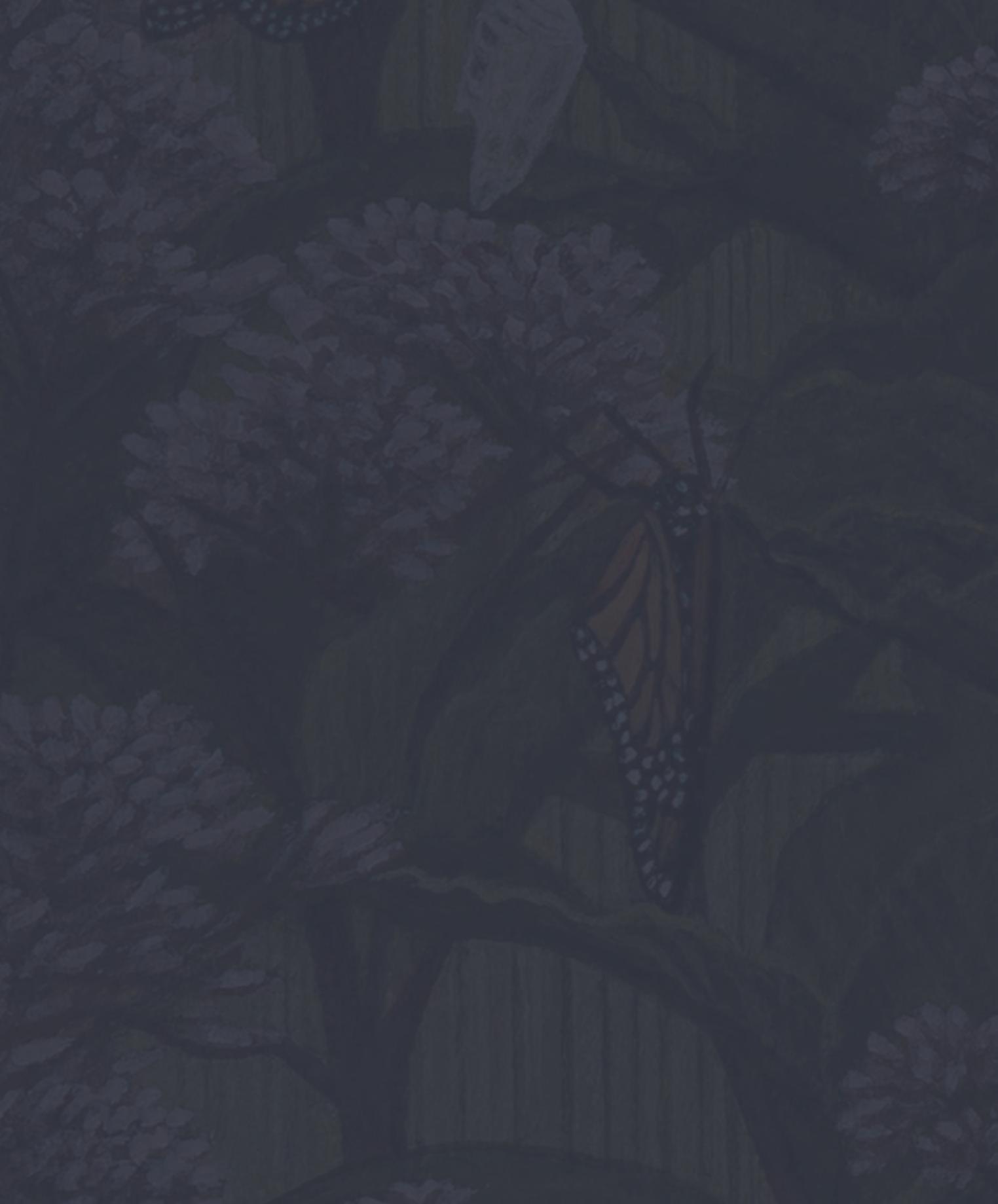
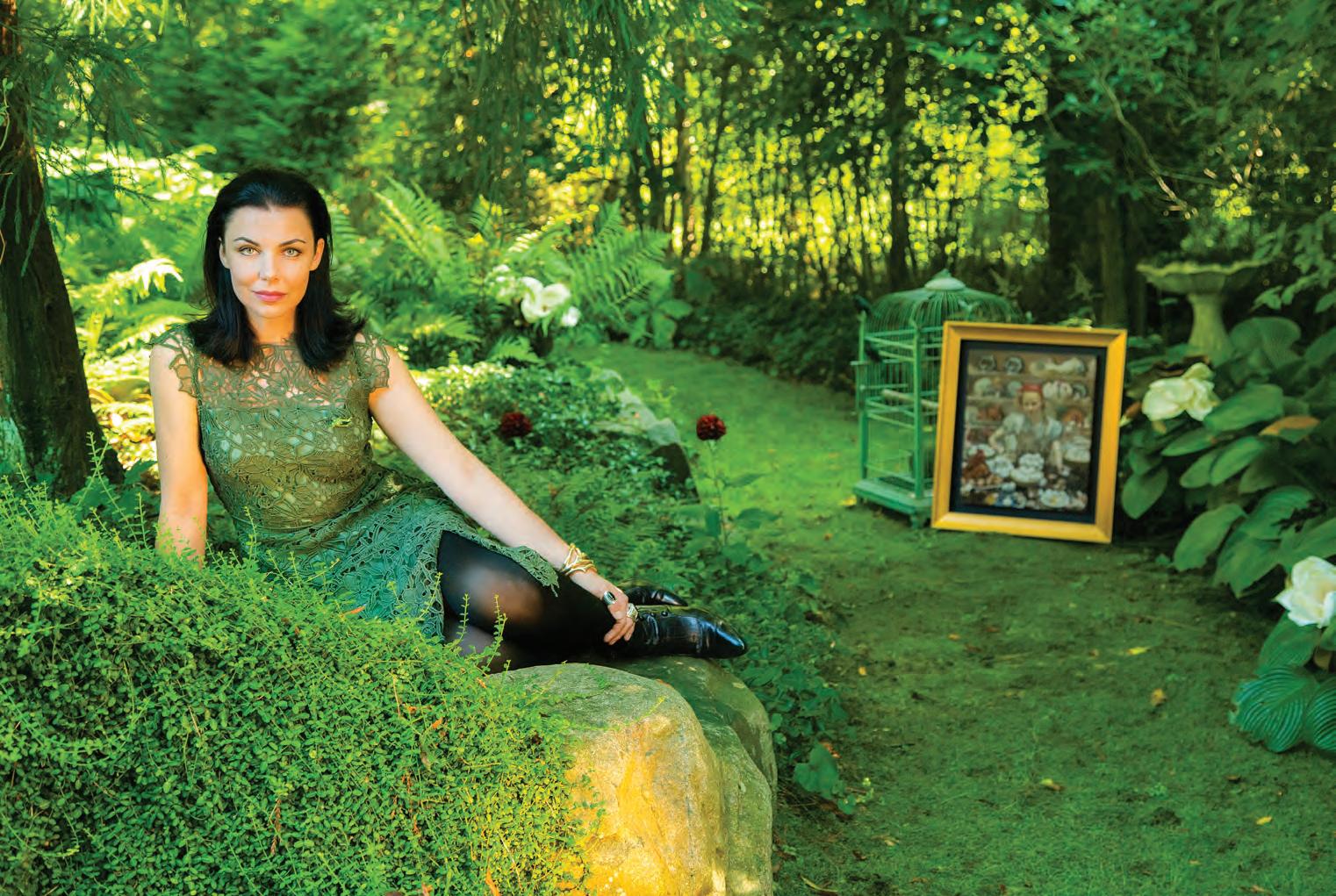 THE ARTIST, ANDREA KOWCH
Photo: Marsin Mogielski
THE ARTIST, ANDREA KOWCH
Photo: Marsin Mogielski


